#there is of course the subversion with luke's first episode
Explore tagged Tumblr posts
Text






Why is that the first question I always ask?
#THE QUEEN OF NICE#i investigated every episode with a new team member and these are the only 3 times she actually specifically mentions niceness#they are in order: alex kate and stephen's episodes#there is of course the subversion with luke's first episode#but i couldn't make it work thematically with these other ones#but i think these standalone nicely (heh)#penelope garcia#criminal minds#my stuff#cm s08e01#cm s10e01#cm s12e08#criminalmindsedit
94 notes
·
View notes
Text
No bc Jordan/Marie really got me around the throat because despite all of the subversion that's common to The Boys universe I really expected them to put Marie with Luke or Andre, just going off the teasers and first episode. I'm so used to television going the easy or less subversive route, even just in The Boys do they do this. Annie and Hughie are in my opinion perfectly cute and super functional in terms of driving the plot forward, but outside of that their relationship is very par for the course and expected. But they just unabashedly went there with Jordan and Marie and it smacked me so hard I don't even know what to do what the fuck
Like, the way the seeds were there all the way at the beginning but could have easily been left as subtext. The way there was always respect between the two of them even when Jordan was unkind to her, the way Marie clearly got under Jordan's skin but the manner of which could have been easily ignored. The way this would have certainly made good slash fic a decade ago but no it's canon and it's right here I am UNWELL
#it was really all over for me when Sam swung at Marie and Jordan immediately tanked his blow#like nuh-uh#that is my girlfriend who I hated a week ago and who I started dating two hours ago#and then episode 5 I just#we#I#🫠🫠#THIS is the academic rivalry to respect to lovers that I NEEDED#fuck#jordan li#marie moreau#limoreau#marie jordan#gen v#the boys#gen v spoilers
434 notes
·
View notes
Text
Feminism (and Not) in Star Wars
Warning: unpopular opinions ahead.
During the last few years, I have often heard and read people arguing that the Star Wars sequels are “feminist”, that Rey in particular is a Mary Sue and, at worst, that “feminism ruined Star Wars.” So, I would like to add my two cents.
It cannot to be denied that the end of the sequels, and with it of the saga as a whole, is highly dissatisfying. But feminism is not what caused it.
The sequels are not feminist at all. Especially not in Star Wars, where the greatest hero Luke Skywalker had ended the conflict through compassion and forgiveness. TRoS in particular is a slap in the face of female dignity and virtue, both for the male protagonist’s mother and for his love interest.
Unfortunately, and that is one of my major issues with the sequels, many things are not being said or explained. This might be due to the fact that Episode VIII was subversive and that so many classic fans ranted and stormed against it; but that didn’t prevent Episode IX from showing, if not saying, a lot of things.
Star Wars is all about subtext, that’s what makes it compelling. Please:
Read between the lines.
Look at what is not being said but shown.
Compare the attitudes of different people in similar situations.
Rey
„You cannot deny the truth that is your family.” Lor San Tekka in The Force Awakens
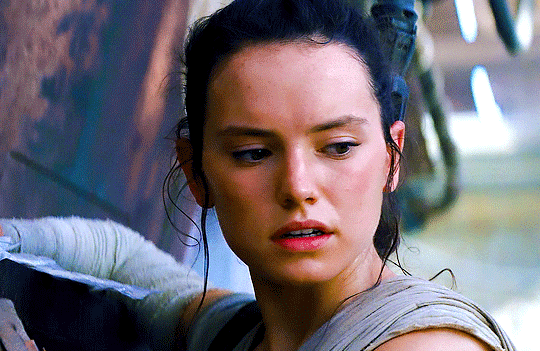
Rey was introduced as a positive female character but then, over the course of three films, her moral corruption was displayed under the lame excuse of a black and white morality (“I am all the Sith” vs. “I am all the Jedi”).
Rey seemed like a reboot of Luke Skywalker at first, but watching her throughout TRoS we see her fail in all instances where Luke had proved himself a hero.
- Luke had forgiven his father despite all the pain he had inflicted on him and his friends. Rey stabbed the „bad guy”, who had repeatedly protected and comforted her, to death.
- Luke never asked Vader to help the Rebellion or to turn to the Light Side, he only wanted him back as his father. Rey assumed that she could make Ben Solo turn, give up the First Order and join the Resistance for her. She was thinking of her friends and her own validation, not of him.
- Luke had made peace by choosing peace. Rey fought until the bitter end.
- Luke had thrown his weapon away before Palpatine. Rey picked up a second weapon. (And both of them weren’t her own.)
- Luke had mourned his dead father. Rey didn’t shed a tear for the man she is bonded to by the Force.
- Luke went back to his friends to celebrate the new peace with them. Rey went back letting everyone celebrate her like the one who saved the galaxy on her own - the woman who was tempted to become the new evil ruler of the galaxy and had to rely on the alleged Bad Guy to save both her soul and her body.
- Luke had embodied compassion when Palpatine was all about hatred. Where he chose love and faith in his father, Rey chose violence and fear.
- Luke had briefly fallen prey to the Dark Side but it made him realize that he had no right to judge his father. Rey’s fall to the Dark Side did not make her wiser.
- Confronted by Vader’s disclosure of his true identity Luke was forced to face himself, to realize that he had been judgmental, arrogant and biased; and after the initial shock he accepted his origins as a part of himself. - Rey did not reconcile with Palpatine as a part of herself. (When she says to him “I don’t hate you” it’s not a sign of superior attitude. It merely shows that she sees him as separate from herself.)
- After realizing what he had done to his nephew, feeling responsible and disillusioned, Luke went into exile for years waiting for his death. - Rey also was appalled at herself, but she spent just a few minutes on Ahch-To until Luke appeared to her, this time telling her exactly what she would have wanted him to say to her on her first visit on the island. This scene was so ridiculously opposite to his attitude in TLJ that I believe he was a fantasy conjectured by her like Ben’s vision of his father.
~~~~~~~~~~~~~~~~~~~~~~~~~~~~~~~~~
Rey failed where Ben had been strong.
- Ben killed Snoke to save Rey. Rey killed Palpatine to complete her Jedihood. (Or at least, what she believes being a Jedi means, i.e. “being always right and winning at all costs”.)
- Ben loved Rey despite all she did to him and took away from him, and she didn’t even honour his name in the end.
- Ben knew the stories of Luke, Vader and Palpatine well enough to wanted to end the Jedi and Sith at last and start something new and better. Rey only knew scraps of old tales and wanted to have them her own way.
- Ben had been under an evil influence in his mind since before he was born; when he finally turned to the Dark because he had nowhere else to go, he was 23. Rey gave in to her Dark Side minutes after meeting her “mother” in the Death Star ruin; the same happened to her again with Palpatine on Exegol.
~~~~~~~~~~~~~~~~~~~~~~~~~~~~~~~~~~
On the ruin of the second Death Star, Rey is at her lowest on the same spot where Luke had won over himself thirty years before in RoTJ.
- Vader had provoked Luke to make him turn - Kylo hadn’t.
- Vader hat traumatized Luke - Kylo had protected and spared Rey repeatedly.
- Vader hardly had had a kind word to spare for his son (except perhaps when he said to him “It is too late for me, son”) - Kylo had comforted her and shown her his human side.
- Vader had lured Luke into a trap twice in order to keep him by his side. - Kylo hadn’t, on the contrary, he wanted to prevent her from running into Palpatine’s trap.
- Luke did not know what had made Vader the way he was when he came to find him, but he was adamant to save him. - Rey knew by the time of their duel that Kylo was largely also a victim, and she stabbed him to death.
- Luke always fought fair. - Rey used the distraction made by Leia’s reaching out to him to impale him - the way she had seen him impaling Han.
~~~~~~~~~~~~~~~~~~~~~~~~~~~~~~~~~~
It is ridiculous to say that it’s a victory of Good over Evil when a young woman uses Jedi training to kill her master’s own son, who was on the defensive, with his mother’s help and blessing. That their weird connection, which was already introduced during the first two films, is explained by way of their being a dyad (one soul in two bodies) only makes it worse. Rey will rather kill the man she belongs to, or die herself, than admit that she needs him. If that is supposed to be “feminism”, it’s a very distorted idea of female independence and strength. Just like it’s not automatically “feminism” to make a girl pose as the heroine because she wants to be a Jedi no questions asked.
Fans discussed and argued about Rey’s family for years; it was a great move in TLJ when she admitted her parents were “nobodies” and that they left her on purpose. It was refreshing to see her carve her life and personality on her own. TRoS shattered this by making her the descendant of the most powerful man in the galaxy; and what’s worse, she wound up being a usurper just the way he was, taking over the Skywalker mantle.
The sequels are feminist only when the audience believes that it’s a happy ending if a female ends up alone with no one standing in her way. They are told from her point of view, so as viewers we will automatically believe that she’s the heroine and root for her (or not, but still believe that it’s her story). Looking only at the bare facts, Rey is much less heroic than she first seems.
At the end of TRoS Rey is alone with two dead people behind her, on a desert planet in company of a droid and with an old, wrinkled woman as her only interlocuter, the way she began, and her mind still has hardly developed beyond that of a child. She is willing to embrace the legacy of both Skywalker family and Jedi although the fate of Ben Solo should have taught her how fu***-up both of them were.
Rey doesn’t want to see. She’s in denial like when she pretended that her family was coming back for her on Jakku. Inside, she is still a child - everything she did was motivated by her desire to find the belonging she ardently craved. She can’t be blamed for that. But does that make her a “strong woman”, or even a “Mary Sue”, like many annoyed viewers claim? No.
Leia
“If you will not turn to the Dark Side, then perhaps she will.” Darth Vader in Return of the Jedi
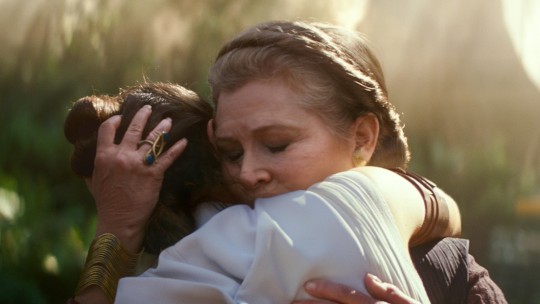
There is something I find much worse than Ben’s patricide or Luke’s panic attack at the Jedi temple. Those were actions spurred by the moment and provoked by Snoke, and both men regretted it immediately. Leia’s behaviour shows an unpardonable attitude for entire decades. Being a trained Jedi herself, she could have taught her son - instead she sent him to his uncle. This seems a practical choice since she was politically active while her brother wanted to start a new Jedi Order, but from the novels we learn that Ben heard his parents arguing and talking about him like he was a monster ever since he was a child, and that when he was sent away this seemed to confirm to him that something was wrong with him and had to be fixed. (From the novels we also learn that he actually had no ambition to become a Jedi and wanted to be a pilot - true Skywalker and also Solo that he is -, but he had no say in the matter.)
After the tragedy at Luke’s temple and the rise of the First Order, Leia fought with the Resistance for years knowing that her own son was on the other side. What if she had met him and been forced to kill him (or if he had come into the situation, as we see in TLJ)? In TFA, she sent his own father to bomb Starkiller Base knowing well that their son might be on board. Leia had felt Snoke’s influence on Ben’s mind when he was still in her womb; so, she knew he had been manipulated for decades, but when she heard of his fall to the Dark Side, she automatically assumed he had made the choice to be “evil”. Only after he had been a part of a criminal organization for years Leia sent her estranged husband to him. She only reached out to him when she was on her deathbed, and I still am not certain whether she wanted to help him, or to make him stop fighting against the girl she had adopted in his stead.
Would Padmé have left her own son in the dumps? Never. Padmé refuted Obi-Wan’s disclosure about Anakin’s fall to the Dark Side adamantly, and went to a volcanic planet alone, with a highly advanced pregnancy, to see a terrorist and murderer because she still saw the good little boy he had been in him. And she would have gotten him out of that hell had Obi-Wan not interfered. If you don’t believe me, watch the scene again: Slowly but surely, Anakin’s expression changes totally on speaking with his wife. Padmé was literally reaching out to him, and she was succeeding. Love, as always, was stronger than anything else in him. And Padmé believed in her husband until her very last breath. “Obi-Wan, there is still good in him.”
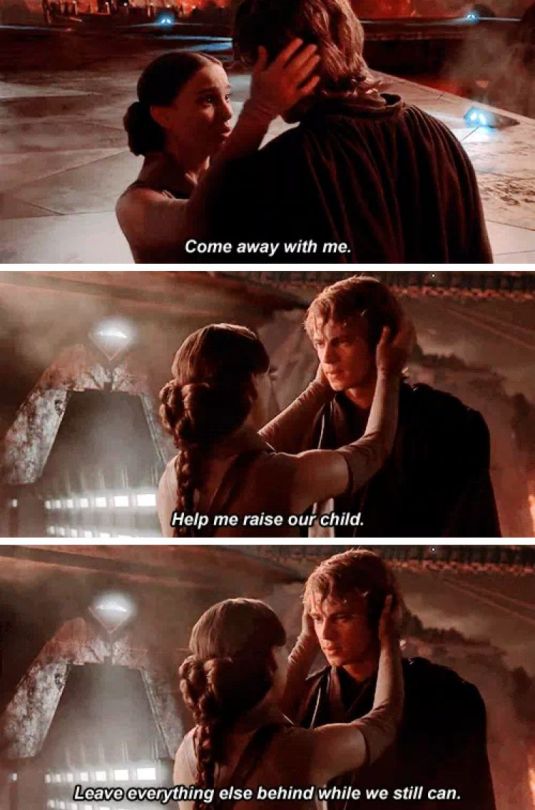
Din Djarin, the Mandalorian of the eponymous tv show, is an outcast who earns his living with dubious business and has killed his fair share of people. But had anyone attempted to do to his little protégé what Snoke did to Ben Solo, I don’t doubt he would have marched on the Supremacy and strangled him with his bare hands. (At least, he would have died trying.) Han would probably have done the same, but Leia deliberately never told him of Snoke’s influence on her son’s mind ever since before his birth. By the time she finally does, as we witness in TFA, their son has been Kylo Ren for six years.
Leia, the princess, the general, the war heroine, had feared her son before he was even born because she sensed that he was like her own father. But she had no qualms and no fear accepting and instructing the granddaughter of her worst enemy. Why?
Because Rey doesn’t waver. She has no doubts. She is not conflicted between both Sides of the Force. In Leia’s eyes, Rey is pure Light Side, so she embraces her wholeheartedly as the child she always wanted. As far as I can remember, Leia has never, the way her brother did, offered love to anyone who didn’t fight on her side. And Rey, who had angrily confronted Luke for his moment of terror which “created Kylo Ren”, did not consider for a moment Leia’s responsibility towards her son. Despite training with Leia for a whole year, she never tells her about Luke’s failure which pushed her son into Snoke’s clutches. Nor does she realize that Leia’s love for her is not unconditional but that it is parallel to her Jedi training. Rey literally becomes both a little girl and a Jedi with Leia, down to wearing pure white for the whole of the last instalment of the trilogy.
Most fans admire Leia for her rebellious, spirited nature. Nothing wrong with that, but it’s not necessarily such a good thing if one spends one’s whole life fighting instead of learning how to preserve peace. Leia is adamant that the side she’s on must win. Like every Jedi before her, she does not know, want or even consider that what the Force actually needs is Balance; and that both her father and her son were not evil because they were strong on both Sides, but that this meant they might have found balance, had they not met opposition to this in everyone they knew.
Leia never approached her relationship to her father (at least as far as I know), never tried to understand him better and forgive him the way her brother had. Considering what Vader had done to her and her friends, she can’t be blamed for pushing away her memories and living in terror of the Dark Side. However, on the long run her incapacity or refusal for introspection is not a strength but a weakness. The one who paid the price is her son, and with his fall to the Dark, the whole galaxy again became prey to the terror that she herself had always fought against in first line.
Vader had been right after all: Leia did fall prey to the Dark Side, though unknowingly. Not only did she give up on her son, she actively helped evil come back to the galaxy by believing to do the right thing: she trained Palpatine’s granddaughter, taught her to deny her own fears and weaknesses, gave her justification for her actions, helped her killing her own “evil” son. If that is not the Dark Side’s influence, I don’t know what it is. Leia denied her son’s potential for good and given up on him long before his fate was sealed, and in the same way she closed her eyes on Rey’s potential for evil. The same “bad” son had to prevent the girl she had taken under her wing from becoming what the old devil Palpatine had in mind, at the cost of his life.
Conclusion
I am not an advocate for feminism on principle. If females can be independent and self-assured, if they shed the cloak of “damsel in distress”, on the downside this also means that they can be or become villains just like men. Many people tend to believe that a woman is naturally better, kinder, softer than a man. The Star Wars saga never bowed to this cliché.
The idea that a woman does not necessarily need a man is positive on its own, but it becomes poisonous if it undermines female trust in men. Star Wars has a long story of lonely, unhappy men (all three generations of Skywalkers), who were denied their natural right to be needed by their women and to keep their families together. One of Anakin’s dilemmas was that he saw Padmé as being too good for him and wanted to prove to her that he was equal to her in his own way. Ben, ironically, felt that he was not good enough for Rey because he was tainted by his larger-than-life heritage, so he wanted to “let the past die” and start something new and fresh with her.
A man naturally wishes to protect others, in particular wife and children. But in all three generations, we find these men whose personalities are split in two and cannot reconcile the two halves of their self: Anakin / Vader, Luke / Leia, Ben / Kylo. Due to the similarity in his two names, I expected the last of the Skywalker blood to finally heal the wound in his personality and become one. Had anyone wanted and needed both, Ben and Kylo, he might have. But Kylo was an aberration to everyone including Rey. Kylo was a villainous figure and as a male, he was aggressive and arrogant; but at least he made his own decisions and had chosen his own name, things Ben Solo never got to do.
This is not to say that the sequels are against strong females or prefer the guys over them: no, the guys f** up at least as often as the women do. But to pretend that Leia’s and / or Rey’s portrayal is unrealistically positive and that “feminism ruined Star Wars” is either extremely short-sighted or a mockery of femaleness.
It is true that women have more and larger roles in the ST, but I can’t see anything wrong with that. Not any more than with the fact that in the OT there was practically only Leia (the few other female characters almost had no impact on the story), and that there were few females in the PT, too. The Jedi Order consisted almost only of men, and you hardly hear anyone complain.
I know that many fans dislike Anakin and Ben, but please let us consider why.
One reason is that in an action movie we usually value coolness in a male protagonist above everything, and that the Skywalkers are hot-headed by nature. Most fans prefer Darth Vader, Han Solo and the likes to the Skywalker men.
Another reason is that the filmmakers have deliberately manipulated our emotions. The prequels are told from everybody’s point of view but Anakin’s, and the same goes for the sequels with Ben, despite the fact that the trilogies are about them, not about “the Jedi superheroes saviours of the galaxy” or “the almighty and untainted Skywalker family”. So, as viewers we automatically identify emotionally with anyone but them. We never get to really know the “villain’s” point of view, we only see how other people react to them; and since these reactions are much more often negative than positive, we get to the conclusion that both of them are inescapably evil, that they chose to be so, and that they deserve their terrible fate.
My suggestion: rewatch both trilogies again and this time try to look through Anakin’s or Ben’s eyes. (And possibly also read the novels and the Kylo Ren comics.)
You could be surprised.
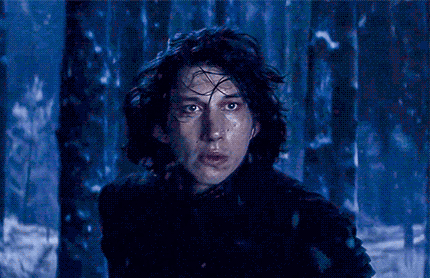
#star wars#rey#leia#ben solo#han solo#luke skywalker#emperor palpatine#kylo ren#the Force#the Jedi#the Sith#bendemption#darth vader#anakin skywalker#the force awakens#the last jedi#the rise of skywalker#return of the jedi#revenge of the sith#feminism#read more
207 notes
·
View notes
Text
The Failure of Rey Nobody
I haven’t done a Star Wars analysis or review in a long time. But with the recent release of Episode IX: The Rise of Skywalker and the subsequent details being revealed, I feel it’s a good time to go over what happened in TROS and how it affects the rest of the saga. Oh, there’s a lot to go over, but I’ll stick with one particular topic that I have an ax to grind on ever since the post-TFA release...
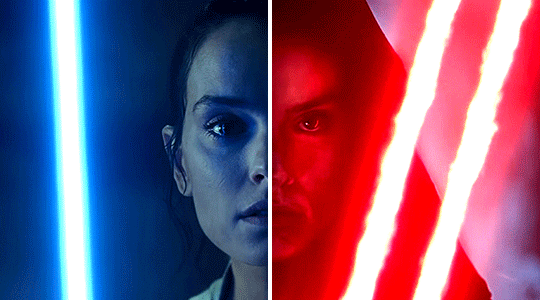
The topic of Rey’s parents and heritage.
As I’ve stated before, this is going to involve MAJOR spoilers from TROS, so please don’t continue reading if you don't want to be spoiled. Let’s begin, shall we?
So it turns out that Rey is actually related to someone important in the Saga. While parents were nobodies just as Kylo Ren said, her grandfather is not. And no, it’s not Obi-Wan Kenobi. It’s Sheev Palpatine.
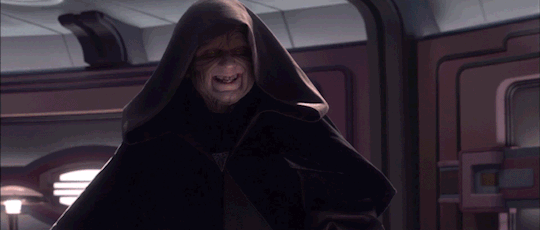
That’s right. Emperor Sheev Palpatine of the FIRST Galactic Empire aka Darth Sidious aka the BIG BAD of Prequel and Original Trilogies... is the grandfather of Rey. And here I thought Harry Potter and the Cursed Child revelation was dumb but at least there I can understand how Lord Voldemort could have a child since he at least has a fanatical lover known as Bellatrix Lestrange. But Palpatine is never shown to have any mistress, not in the films or expanded media. And his characterization indicates that old Sheev only cares about power and immortality. Why does he need to produce heirs when he has a powerful Darth Vader and his more powerful offsprings, Luke Skywalker and Leia Organa, to groom for the throne? That is if he ever wants to give that up.
Regardless of that fact (that’s for another topic), the fact that Rey is revealed to be a Palpatine completely undermines the argument that Rey Random/Nobody advocates preached for the last three years or so. That making Rey a nobody with unremarkable parents would send a stronger message for the audience and kids. That making her a Skywalker would somehow imply that you could only be a hero and a Jedi if you came from Force royalty bloodline. And that revealing that Rey is unrelated to anybody is a “great” subversion of the Luke, I Am Your Father trope.
I don’t know about you, but having Rey be related to the Lucifer of the Force, the most evil man in the galaxy, and the mastermind behind the Empire and the First Order, that is anything but a nobody. It’s pretty much making her a Skywalker except with none of the actual Skywalker relationship benefits like good family members (Luke, Leia, and Padme) and a dynamic with Kylo Ren that isn’t Reylo. Oh, I can see all of those TLJ defenders being pissed off about TROS retconning the Rey Nobody reveal and blaming JJ Abrams for “caving” to the angry fans... but honestly, this was inevitable.
Rey Nobody was doomed from the beginning.
Why? Because it offers no real narrative after the revelation. It’s a meta-subversion that went after a short-gain that wasn’t needed to begin with. Here are several reasons:
1) The idea of a Nobody becoming a hero or a Jedi is not new in Star Wars.
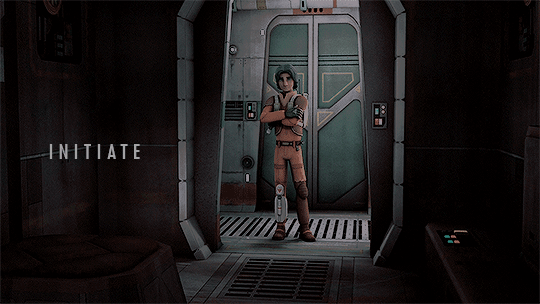
If you only see the films on a surface and don’t pay attention to the EU material, you’ll be left with the impression that the Skywalker family are the only people who have the Force due to their ancestor, Anakin, being literally born from the Force in a virgin birth. But if you think about it for a moment, you would know that the Skywalkers were an exception to the rule. Jedi were celibate and they were not supposed to have families. How Force-sensitive people were found were dependent on luck, and Anakin himself came from a lowly position of a slave in a backwater planet of the Outer Rim.
So by default, potential Jedi always came from random people scattered across the galaxy. Their parents were almost always muggles, and there’s no great mystery about them beyond what happened to them. And for a Jedi, their story path lies ahead, not behind unless there is something about the past that they should know.
Story-wise, the default explanation for Rey’s origins is that of any Jedi. She’s a nobody born to a bunch of nobodies and lives on a backwater planet with a greater future ahead of her. The idea that is somehow a revolutionary concept in Star Wars is almost laughable. It’s the same as making a big surprising revelation that Mulan is a woman in an army where every other soldier else are women as well. People can accept Rey Nobody from the beginning like every other Star Wars character introduced in the Saga. It’s only when you imply there’s more to the character than meets the eye...
2) The Mystery Box Hype
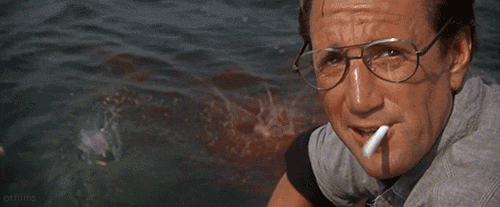
The Mystery Box is designed for one thing only. To make you generate hype and investment into something that has very little to show. It’s a great ploy to draw in an audience and see where you can take the story that would please the most people. But the Mystery Box has a critical weakness. Sooner or later, people would want to know what’s in the box, and they have spent money and time for that box. The last thing they want to hear is that they paid for an empty box.
This is the undiscussed part of the Mystery Box factor. People would rave about how Steven Spielberg created suspense and true terror by not showing the shark when it attacked people in the film. But what they don’t talk about is that Spielberg nearly destroyed himself and his production trying to get good footage of the shark in its full glory. Spielberg knew that the audience wouldn’t forgive him if he never showed them the actual shark that he hyped up from the beginning.
This was a critical flaw in Rey’s Mystery Box heritage. As stated before, Rey started off in the film as a nobody. That was no mystery. So to imply that there is something hidden from the audience, something that vague enough for Han and Maz to get lingering shots about her identity, creates higher expectations. It’s not necessarily about her parents but rather her role in the story. All of the Skywalker Saga visions, Anakin’s Lightsaber, Luke being her destination, etc. They seem to hint that Rey is important to the Skywalker family, whatever that reason may be, and it’s something that no other Force-sensitive person could do except her. Of course, the big reveal in TFA is that she is Force-sensitive (as if that is surprising) but TFA didn’t clear up on Rey’s parents. No faces, no names, nothing. They are still a mystery that needed to be resolved despite what Maz Kanata states otherwise to Rey. So we have two mysteries regarding Rey: Her connection to the Skywalkers and the starship leaving Rey on Jakku.
These two mysteries could be connected but not necessarily so. But they had to be addressed in some way or some form.
And did TLJ address these two mysteries? No. It didn’t. The best answer for the Skywalker connection is Snoke’s “The darkness rises and the light to meet it,” implying that Rey was destined to rise and combat the evil that is Kylo Ren. Which is a generic answer that doesn’t explain why it has to be her and not someone else (remember, she didn’t choose to be the hero when those TFA visions happen). The other mystery, her parents, is a non-answer. Instead of revealing why the starship left Rey, TLJ focuses on the identity of the parents and reveals them to be filthy, deceased junk traders who sold their daughter for money. It is clearly a meta-message to say that Rey has no place in the story and that she must forge her own path as Rey Nobody... except it answers nothing.
It’s the same status quo that Rey was in from the very beginning of TFA. She’s a nobody who would become the next Jedi hero and her parents are unimportant for the story. Most reveals like Darth Vader being Luke’s father or that Bucky killed Stark’s parents are effective because they move the plot further and gives us something to look forward to as we wait for the sequel to answer the questions from the reveal (like how would Luke face his father, how would Cap and Iron Man repair their relationship, etc.). But with Rey’s mysteries being revealed as something we would already be accustomed to, there is nothing for the audience to wonder for the next film. Why should we care about the ship in the flashback if it’s just Rey’s parents selling Rey off for drinking money? Why should we care about Rey’s connection with the Skywalker Family if she is not part of their story?
3) Meta-Narrative over In-Universe Reason
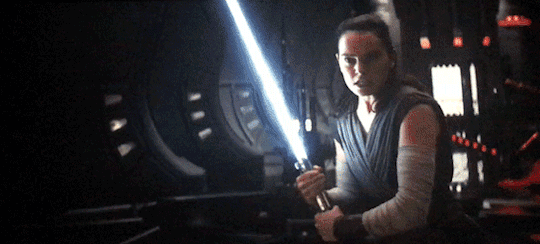
If you hadn’t noticed already, I’ve made a big emphasis on how Rey is assumed to be a Nobody at the beginning of TFA. That is no mistake. Because in-universe, Rey has no reason to believe that her parents or heritage were anything special. She doesn’t believe that she is a Skywalker or a Palpatine. She’s just an orphan lost in a world that has abandoned her. She would be glad to find a new purpose in her life and resolve her parental abandonment issues. This is Rey’s character at the end of TLJ. It hasn’t changed since the end of TFA. She learned nothing about herself except the confirmation that her parents were indeed nobodies. Despite what Rian Johnson may say, that is not the worst thing Rey would hear as an answer.
Luke was content with his father being just a spice freighter navigator, and he was delighted to hear that his father was really a powerful Jedi Knight. The answer that broke his spirit wasn’t Anakin was “a filthy junk trader” who gave him away to Uncle Owen; it was learning that Darth Vader, the evil man that he hated for killing his father and Obi-Wan, was his father Anakin. To be related to an evil mass murderer who now wants you to join him and take over the galaxy together can traumatize any orphan who longed for a family, including Rey.
But Rey Nobody doesn’t offer that emotional narrative. Rey Nobody was the starting status quo of TFA and TLJ offered nothing for Rey’s character beyond a “romance” with her archenemy. The mysteries surrounding Rey have been answered with the starting status quo in an attempt to send in a meta-message that was unneeded from the beginning. In short, Rey Nobody renders Rey to be a static character as everything about her was already answered in TFA.
Now compare that with Rey Palpatine.
Rey Palpatine, as dumb as it sounds, actually raises the stakes for her. She is now related to the most evil man in the galaxy, and that evil man wants her to join him (or inherit the throne). Rey must confront her grandfather and is now faced with the prospect that she would turn to the Dark Side because of her Palpatine blood as well as the moral dilemma of getting the family she wanted at the cost of knowing they are part of the most hated lineage in the galaxy. There is tension, there is a personal conflict badly needed for her after TLJ...
And all of this could have been done with Rey Skywalker. Rey Skywalker would have a lot more personal stakes, tensions, and weight considering how the films are billed as the Skywalker Saga. It would have been perfect. Instead, we get Rey Nobody... which didn’t offer JJ Abrams the conflict he needs for her in Episode IX thanks to the last two episodes playing around Mystery Boxes, so he retconned Rey as a Palpatine instead. A Morton’s Fork at work, congratulations!
If you wanted Rey Nobody, you should have started her as Rey Nobody and then build up her character to make us care instead of surrounding her in mysteries that may not be satisfied.
#star wars#the rise of skywalker#episode ix#TROS#the last jedi#tlj#episode viii#the force awakens#TFA#episode vii#rey#rey random#rey skywalker#rey solo#rey kenobi#rey palpatine#kylo ren#ben solo#Luke Skywalker#Darth Vader#leia organa#Emperor Palpatine#darth sidious#rey nobody#anaylsis#rant#mystery box#jj abrams#Rian Johnson#tros spoilers
43 notes
·
View notes
Text
Okay, these are not expert/Hardcore Nerd opinions, but I’m so used to being surrounded by Star Wars and keep being surprised that other people aren’t, so...Some Kind Of Star Wars viewing guide for people who aren’t into Star Wars
STARting point:
Basically, if you like robots, aliens, and big space battles (and/or are a special effects or sci-fi design nerd), you’ll probably enjoy Star Wars. If you don’t...the writing and acting quality varies from version to version, and between different movies in the same trilogy. Star Wars is more a thing to enjoy because it’s fun, not to appreciate as high art (unless, again, you’re a nerd for special effects or design).
The original movie, aka Episode 4: A New Hope, is the best starting point because it sets up the central characters and conflict, is a lot of fun, and if nothing else you’ll get like 60% of the Star Wars references people make.
Episode 1: The Phantom Menace is also a lot of fun and could be watched as a standalone, but the plot can be hard to follow, and the other Prequel movies (Eps 2 & 3) are best viewed through the lens of “how does this inform the events of the Original Trilogy” since they’re kind of awkward, confusing, and depressing without that context. Only start with 1: The Phantom Menace if you have some nostalgia for it.
Episode 7: The Force Awakens is also a lot of fun and has the added bonus of a more diverse cast, but it and its sequels heavily build on and reference the events of the Original Trilogy. The basic plotline of “evil fascists VS people trying to stop them” is probably easy enough to follow, though, so you can probably start here if you’re okay with getting some Original Trilogy spoilers, but you’ll most likely want to watch The Original Trilogy before watching 8 or 9.
Rogue One and Solo take place before The Original Trilogy and can probably be viewed first if you like the cast or concept of either (Rogue One: “here are the people on the ground doing the hard work that sets up the other heroes’ victories,” Solo: “it’s a heist movie IN SPACE!”), but they’re fairly dark by comparison and some of the big reveals or other details might make more sense with the context of seeing the Original Trilogy first.
The Mandalorian takes place on the fringes of the Star Wars universe and barely references any events or characters from the rest of the franchise (and even then, neither the audience nor the main character are expected to know who or what they are), so you can start here if you don’t mind minor spoilers for who won the (Original Trilogy) war.
The Original Trilogy (4, 5 & 6, 1970s-80s)
Lots of fun, heavily referenced in pop culture, great designs and cool puppetry and other practical special effects. These are the movies with Mark Hamill as Luke, Carrie Fisher as Leia, and Harrison Ford as Han Solo. All of them are great and bring a lot of charisma and humanity to their performances. 4: A New Hope is the really iconic one and is mostly a fun adventure through space. A lot of people love 5: The Empire Strikes Back because it’s darker and hate 6: The Return Of The Jedi because it’s sillier, but honestly, it comes down to personal preference.
Once you’ve seen The Original Trilogy, you can freely watch either of the other movie Trilogies. Just watching 4 is enough to let you skip over to the standalone movies or the TV show The Mandalorian.
The Prequel Trilogy (1, 2 & 3, 1990s-2000s)
These are the movies with Ewan McGregor as young Obi-Wan, Hayden Christensen as Anakin, and Natalie Portman as Padmé. A lot of people shit on these for being “bad movies,” and yes the acting is often flat, the plots can be hard to follow (Original Trilogy is a simpler “bad government VS good rebels,” Prequel Trilogy has a lot of political manipulation and nuance but doesn’t explain it much), and a lot of it is watching people making decisions that you know from the Original Trilogy are going to turn out badly. But I unironically love them, and they have really amazing design and special effect work (the CGI of course looks dated now, but it’s still phenomenal), and a lot of fun moments. 1: The Phantom Menace is another fun adventure through space, but with a lot of awkwardly racist alien caricatures who are thankfully played down or removed from the other movies. 2: Attack Of The Clones is a space adventure with an unfortunately uncomfortable romantic subplot, and 3: Revenge Of The Sith is relentlessly dark but I like the emotional drama of it. Again, either you’ll think they’re fun or you won’t.
Like I said above, these are best watched after having seen the Original Trilogy, to inform the backstory and characters’ actions, VS being watched as standalone movies.
The Sequel Trilogy (7, 8 & 9, 2010s)
These are the movies with Daisy Ridley as Rey, John Boyega as Finn, Oscar Isaac as Poe, and Adam Driver as Kylo Ren. Like with the Original Trilogy, all of them are great and bring a lot of fun and depth to their characters, and also 7: The Force Awakens is a fun space adventure, and people are divisive over 8 and 9, 8: The Last Jedi being darker and 9: The Rise Of Skywalker being lighter...but with the added meta-drama that 9 spends the entire time trying to undo or contradict things that happened in 8 (and an extra level of meta-grossness in that 9 seems to bow to things that Toxic White Guy fans hated about 8, like removing a major WOC character). I personally prefer 8 because it’s a neat subversion on a lot of accepted lore and concepts from the Star Wars franchise and was disappointed in 9 as a result. But once again it comes down to a matter of taste, and at the end of the day the main thing about Star Wars is fun dialogue and cool sci-fi stuff.
These should be watched after The Original Trilogy because they heavily build on and reference the events of it, though 7: The Force Awakens is a reasonable “First Star Wars movie” if this is the version you’re most interested in...just with inherent spoilers for The Original Trilogy.
Standalone Movies (Rogue One & Solo, 2010s)
Rogue One takes place immediately before The Original Trilogy but is darker and more of a heavy action-drama about people making difficult choices, with a good, largely-POC cast. Solo also takes place before The Original Trilogy, though I feel it has some clunky writing (a droid character who’s reasonably upset about the literal enslavement of her own kind is treated as delusional and comic relief??) and also gets pretty dark with lots of character deaths, but it has the fun of being a heist movie with a conscience.
Like I said above, these can prrrrobably be watched without Original Trilogy context, but at least Rogue One is probably more rewarding if you’ve already seen 4: A New Hope.
The Mandalorian (TV show, 2020s)
This is the show with “armor guy and Baby Yoda” X’D It’s basically a Western about a guy drifting from town to town across space and helping people with their problems...which mostly involve fighting and killing people. As always, amazing designs and special effects, and I find the writing consistently compelling. There are a lot of bonuses if you recognize a character, character design, or prop design from another Star Wars media, but since you don’t need to know them in order to understand the episode you’re watching, you may not even realize they’re references (which is the BEST way to do a reference).
This takes place immediately after The Original Trilogy, but you can watch this first if you don’t mind knowing who wins the war. Though there are a few worldbuilding details (like being able to recognize the evil Empire’s uniforms or ships) that are probably a bit less confusing or a bit more rewarding if you've at least seen 4: A New Hope.
Other Media
I haven’t seen/read/etc much of any Star Wars except what’s listed above, so I can’t really offer any advice here. But the CGI TV show The Clone Wars probably relies on you knowing the plot of Prequel Trilogy eps 1 and 2 (since it takes place between 2 and 3)...and if you’re jumping into some other Star Wars media and you can’t understand what’s going on, look at its copyright date and check what movies came out before it did, to gauge what you’d need to watch for context. But all the movies only rely on knowledge of other movies, the other media are about fleshing out other aspects of the universe or things that happened between/before/after the movies.
Otherwise all I can say is that the Star Wars: Droids cartoon from 1985 is delightful and the few eps I’ve watched don’t require any Star Wars knowledge whatsoever. (It’s long out-of-print but some kind soul put it on YouTube.)
1 note
·
View note
Note
Rian Johnson should've read your blog so we wouldn't get Jake Skywalker
Well, that’d be kind of hard since I only started this blog a couple months ago~
Anyway, while I didn’t much care for episode 8 either, I will say that I don’t think that it was intending to promote depressed!Luke’s perspective as correct - it just happened to be what a lot of fans wanted to hear, so they ran with it as some ““deep”” and ““subversive”” message of the film. But since depressed!Luke a) is depressed, b) reconsiders his perspective by the end of the film, and c) really wouldn’t know anything about how the prequel-era Jedi were actually undermined and destroyed (he wasn’t there, and even if the ghosts told him about it - which they probably didn’t, at least not in-depth - they’re pretty self-critical to begin with and wouldn’t really be able to get across what it was like at the time, either), I don’t think he’s supposed to be taken at his word when he bitches about the Jedi.
Could the movie have been better at getting that across? Yeah, definitely, but I also think that you could beat the audience over the head with “The Jedi are not the problem here!” in flashing neon lights and fandom would still find a way to insist that the Jedi are narratively supposed to be blamed for everything that goes wrong in Star Wars. So it’s hard to say at what point the communication failure is on the part of the film, or on people hearing only what fits their preconceptions.
I do have my problems with Luke’s portrayal in that movie, but that’s more to do with it coming across as jarring for cheap shock value, rather than being earned. A handful of flashbacks doesn’t cut it - if you’re going to break down such an established hero, we need to follow that journey first, not dumped suddenly into its nadir (if this was some character we’d never met before, then he’d be fine! But since we know him, and know him well, it’s jarring and unsatisfying). Especially when you’re supposed to be passing the torch to the next hero, and her own journey comes across as secondary - not absent, but in large part propping up the journeys of Luke and Kylo rather than getting the central focus. At least that’s how it came off to me. Of course intersecting with other characters’ journeys isn’t inherently a bad thing, but the way it was done just didn’t seem right for a protagonist.
But meh. I see the sequels as a soft reboot and don’t really engage with them in my conception of Star Wars, anyway. I’m not upset by their existence, but I’m also really not interested in connecting them to the rest of the universe.
#sequels salt#tlj salt#i guess?#i just want to tag courteously when it comes to things like this so people don't have to see complaining that they don't want to#apollonkondric
17 notes
·
View notes
Text
The Handmaid's Tale: Under His Eye (3x07)
This episode was... kind of all over the place. As is always true with this show, there was plenty to enjoy, but I felt myself very frustrated with the overall scope of this installment. Let's take a look.
Cons:
The problem with this episode is... well, it's June, isn't it? I've talked in previous reviews about her plot armor, and that comes out in full force here. She's so lucky that Mrs. Lawrence is docile and nonthreatening. She's so lucky that nobody figures out what she was up to at that school. She's so lucky that when it comes down to it, the Martha helping her is the one who gets punished, even though she was the one pushing.
And what are we meant to make of the ending of this episode? June participates (is forced to participate) in the execution of various subversives, including the Martha who was helping her with the chance to see Hannah. Is her look of disgust and vindication aimed at Lydia for forcing her to do this, or is she pissed off in that moment at the Martha, for failing her? And then she goes apeshit on Ofmatthew when she realizes that her companion is the one who turned on the Martha... which is just... I mean, again, the plot armor is unbelievable, and June's attitude is kind of abhorrent here. There's this moment when she's sympathizing with Ofmatthew over her complex feelings over being pregnant again. But when it comes down to it, June seems to have forgotten that anybody else in this society is suffering. She's not the only one who has been removed from her child, and yet she's acting like she's the sole victim in this scenario.
And there's the elephant in the room... race relations in Gilead. I read another review recently that talked about how we've all been giving this show the benefit of the doubt, waiting for them to start having nuance as related to race in this society. The show seems to have some crazy idea that they can get away with ignoring the issue entirely. Are we meant to believe that Gilead is a 100% color-blind non-racist society? That's some crap. You can't get away with that. In this episode you have the Martha that June is partially responsible for killing, and also Ofmatthew, both black women who are basically victims of June's personal crusade, and is the show grappling with the effects of that at all? Nope, of course not. I feel incredibly under-qualified to talk about this subject, and others have said it better than me, but the point is... they need to get some coherence in the way they regard race in Gilead. Ignoring it isn't working for them.
I really like Mrs. Lawrence and I want to talk about that in a second, but first I need to complain just a little bit more about June, because... what was her plan, here? She wanted to see Hannah at the school, so she drags poor Mrs. Lawrence into it? And then she screws it up and freaks everyone out and doesn't even get a glimpse of her daughter, so... what was the point of all of this? I can understand the desperation angle. June will do anything for her daughter. Okay, fair enough. But this didn't read like the actions of a desperate mother. This was a calculated move by someone who appears to be really bad at being a rebel.
Pros:
Mrs. Lawrence, though... she's interesting. We're not given a clear understanding of what exactly is going on in her head. She's clearly got some PTSD or mental illness, but we're not being given specifics. Unlike the way race is dealt with in Gilead, I do think there's some real thought and cleverness to the way neuro-divergent behavior is treated by the narrative. Because... Gilead ignores it. They push it under the rug and just keep pretending everyone can fit into their assigned roles. Janine is an example of this, and so is Mrs. Lawrence. As long as Commander Lawrence can keep her behind closed doors and keep her calm, nobody needs to be bothered about what's going on with her. The fact that June exploits what she sees as a weakness with this woman is troubling, but in a way I think the narrative is aware of. She's willing to manipulate her in order to get to Hannah, but she also feels a connection to her, and recognizes her as a fellow victim of this system, despite Mrs. Lawrence's privileges as a Wife. I continue to be intrigued by the Lawrences, and I want to see much more.
I debated about whether to put Serena and Fred in the "Pros" or "Cons" section, because it depends hugely on where this is going. If, in future weeks, we see that Serena finds out that Fred is keeping Nichole in Canada for political reasons, and that causes a final rift between them, and Serena becomes a full-on rebel... well, I don't think I'll be happy with this. I think it'll be a lazy excuse to avoid further examination of Serena's culpability. But if instead, we continue to see Serena being seduced by the possibility of life in D.C., if we see that she's okay with Handmaids being literally silenced... and then Fred betrays her, and she tries to have it both ways? Yes. That's the story I want to see. Serena is a villain. She's a villain played by an incredibly talented actress. She's a villain who really does long for a child and would probably be a very doting mother... but she's a Bad Guy. I have my fingers crossed that the show isn't going to forget that moving forward. The sight of the Commanders and their Wives having a lovely little party, of Serena giggling with the ladies and sharing a romantic dance with Fred... that's chilling, and I think it's meant to be. Serena is seduced by the privilege of her position. That's the person she really is.
The best thing about this episode was the stuff with Emily and Moira. I was just complaining about Moira not having enough to do this season, and while I still wish we could have even more, it was so fun to check in with her and see that she is adjusting pretty well to her life in Canada. Emily is also trying to adjust, but she's having to come to terms with her behavior while in Gilead. She killed people. Yes, in the context of her life there, she was doing what she needed to do to survive. But still...
And then there's Moira, who has also killed. These two women don't have a lot in common, which I thought was adorably demonstrated when Moira remarked in frustrated amusement that they're the only two lesbians ever to have nobody in common. They end up going to a protest, to try and hold Canadian officials accountable for negotiating with Gilead. Things get heated, and Moira and Emily are both arrested.
There's something so great about seeing this moment of resistance and response. Because of course it would be scary to be arrested, no matter the circumstances, but there's such a clear-cut difference between how Canada responds to this kind of behavior, vs. how Gilead does. Emily and Moira are chatting casually in their cells, waiting for Sylvia and Luke to come pick them up. And they're angry about what's happening in Canada, but they're allowed to be angry out loud. I love watching these two women bond. They have so many life experiences in common, but they are fundamentally different people. Watching them play off of one another teaches me so much about both of them as individuals. I particularly like the way Moira is putting in this extra effort to make sure Emily is adjusting.
And did anyone notice the heart-stopping plot moment that happened during that protest? Emily says, out loud in front of Canadian officials, that June gave Nichole to her. Obviously we the audience knew that, and Serena and Fred knew that, but the world at large technically doesn't know that June was in on the plan to smuggle Nichole out of Gilead. I'm not sure if they are going somewhere with this, but when Emily said that, I literally said "oh, shit" out loud to my TV screen. This is the kind of good plotting that has always excited me about this show. This season has been lacking in genuinely intriguing "oh shit" moments, because a lot of it is the same horrors we've seen before. But this one? Dang. I'll be keeping my eye out.
So that's that. This episode was definitely a weak point, but a weak point in this show is still definitely worth watching for so many reasons. I still have faith that we've got more good material ahead of us.
6.5/10
#review#the handmaids tale#the handmaids tale review#handmaids tale#handmaids tale review#the handmaid's tale#the handmaid's tale review#handmaid's tale#handmaid's tale rview
67 notes
·
View notes
Text
Andi Mack 3x11 Review
One in a Minyan was a truly historic episode and one of the best, if not the best, episode of the series so far. Let’s dig in!
Positives:
Cyrus saying the word gay was such an important moment; the kind of moment that will long outlive the show itself. There’s a power in naming things and Cyrus not being allowed to use the word gay was a black mark on the show that has now been scrubbed clean. I never thought we’d see this day until Josh hinted at it last week; we’ve come so far from the days when the Mack chat kids were visibly straining to avoid saying the word gay after Cyrus came out to Buffy in 2x01. I commend Terri for getting this approved which I’m sure wasn’t easy. It will really help a lot of kids and adults to see an openly gay boy on a Disney show say that he’s gay and will hopefully open the door for more moments like this on other shows and networks
And such growth for Cyrus; he was so sad and scared when he came out to Buffy and now look at him
Stellar acting and writing all around. Josh delivered a show stopping performance and Asher did great as well. Jonathan Hurwitz should be commended for such a great script; there were some really sharp lines
Loved the dark humour in this ep. Cyrus saying they just buried Bubbe so she’s probably not coming, to the old ladies wagering on who would die next, and Cyrus telling Jonah that if he died they were set up for Shiva
And some very heart warming lines as well. It’s always nice when Andi can be involved in Cyrus’ sexuality story line as it makes it more powerful when lines on Andi Mack are being delivered by Andi Mack herself. Her telling Cyrus that it was his choice when to come out or to whom but he didn’t need to be afraid as people love and care about him was very moving.
I liked the poignancy of Cyrus regretting not telling his Bubbe. He’ll never get to tell her but he still has a life to lead and people he can tell
Andi hugging Cece and telling her that she still has her Bubbe was lovely, we don’t get to see too many moments like that between them. Loved Celia still not liking being called a grandma in any language
Jonah’s chill reaction to Cyrus coming out to him is very in character. They’ve done a wonderful job of building a deep friendship between Cyrus and Jonah that they weren’t allowed to focus on while Cyrus still had a crush on Jonah
TJ’s scene was brief but very nice, it was a sweet gesture for TJ to bring challah. Having Andi ask if that was TJ was a sly way for the show to direct more attention to his presence there. It wouldn’t shock me if we see a callback to the ‘’You came/Of course I did’’ moment towards the end of the season. I liked the subtle touch of Cyrus smoothing his shirt as he stood up to greet TJ. And interesting call back to have the same music for their scene and there was for Cyrus’ first kiss with Iris though only the most dedicated of fans will know that
It’s subtextual but I’d hope the casual audience would clue in to TJ arriving right after they discuss Cyrus’ former crush on Jonah and right before Cyrus and Andi tease Buffy about Marty not to mention the very fact that he even showed up in this Cyrus focused episode and realize that he’s Cyrus’ love interest
This marks the 3rd ep in a row where a love interest has shown up briefly at the very end of the ep: Walker, Marty, and TJ.
As an aside it’s noteworthy that they’re flying in recurring characters for such small scenes when they didn’t really do that for S2; a sign of the shows increased budget and a side-effect of Bowie being a main and needing more screen time
I think this ep was probably the most successful at balancing the Macks and the other characters so far this season. The Cloud 10 scene was out of place but otherwise they all fit in very nicely. Bowie’s dramatic exit was funny and I think this may have been one of the eps with the least amount of Bex screen time which worked in its favour
Celia was used perfectly, I loved the cold open with her and Andi. It really showed how much Andi and Celia have in common; they can both be brusque and can have a harshness to them that Bex and Bowie lack.
I liked the callback to the pilot with Andi making a lamp out of Bex’s old cd’s. We know that Andi explores her art later on in the season and I wonder if we’ll see her centrepieces at the wedding
It was great seeing the focus on Jewish culture; all the small details were interesting to see and look up later. And I liked that they got the same Rabbi they used for 2x13 back, a nice little bit of continuity
I’m glad that Andi and Cyrus aren’t even pretending that Buffy isn’t interested in Marty romantically to some extent, it’s going to make the dramatic journey from here to Machel sinking in 3x17 that much easier
It was nice seeing Cyrus’ parents even if briefly. They didn’t bother bringing back the step parents which isn’t super surprising; it was great to have Cyrus come from a complex family but having 4 parents makes it way too hard for the show to give them any focus
I’m assuming Bubbe Rose was Norman’s mother since Leslie referred to her as Rose rather than as her mother
Aunt Ruthie being so hetero-normative was realistic and I’m glad they had Andi have that encounter with her rather than Cyrus
I’m glad they went with One in a Minyan as the title especially as it doubles as a touching tribute to Terri’s father it being the inscription engraved on his headstone
Looking Ahead:
I’m going to skip the negatives section for this ep; we all know the restrictions imposed on Cyrus’ story line and there will be plenty of time in the coming months to dig into the price the show paid for what got approved this episode. It’s a shame Cyrus won’t come out to his parents though it wouldn’t shock me if we get a brief mention of it in the show or in the texts towards the end of the season
We already knew from Josh showing that title page for 3x12 that they filmed on the day they also filmed at the amusement park which was in the middle of filming ep 13 but it looks like all the park scenes are for 3x12. I trust Luke’s imdb which has been very accurate so far so I’m inclined to think that him and Raquel were just at the park to hang out once the other kids were done filming
Finally the wish gets revealed; I wonder how much of the audience still remembers it by this point
If Buffy assumes that Jamber is back together then that likely means Jibby is already sunk; we’ll see what the texts mention these next couple of weeks
I don’t think Jamber is back together though I do hope we at some point get Amber apologizing for her mistreatment of Jonah
The promo certainly makes it look like Andi knows for a specific reason that Jamber aren’t back together and if the wish is Jonah’s and it is about Beck family issues then I could see his closeness with Amber being because they are supporting each other with their family problems
Not happy to see Miranda or Morgan back. I wonder if she causes trouble by trying to plant the seeds of doubt that one of either Bex or Bowie really wants another kid or if she mentions being married and getting divorced
Peyton’s dad guest stars next ep though he had been listed for 3x13. Bex does look like she could possibly be getting cold feet and if the wedding will go awry before being brought back on track it has to happen soon
I think the set up of this ep is close to what we’ll see in the finale; lot’s of small moments with lots of characters mostly taking place in or around the Mack house
It will be very interesting to see if they let Cyrus or TJ use the word gay again or if this was a one time deal. If TJ could tell people he was gay in 3x19 it would make it much easier to get to the Tyrus confession scene in 3x21; presumably Cyrus and I’d hope his friends, would have to have some reason to believe that TJ could reciprocate his feelings
I’ve never subscribed to the Jonah will figure out Tyrus’ feelings and play matchmaker theory because it’s wildly out of character, his obliviousness has been his most consistent trait. But I do find it noteworthy that they’ve spent all this time building up the friendship between Cyrus and Jonah and also dedicated an ep to having Jonah and TJ become friends. It would be very subversive to have Cyrus go to Jonah for romantic advice; it’s not often we see a straight guy giving his gay best friend advice on guys and it does make some sense with Jonah having had the most relationships of any of the characters. The safest and easiest route is just have Cyrus talk to Buffy about his feelings in 3x19 and there would be nothing wrong with that especially as Terri wouldn’t have had much leverage left when negotiating the final eps with Disney but it does seem like the kind of progressive move she would go for if allowed
It will be interesting if anyone else other than TJ finds out that Cyrus is gay. If Marty and Amber and Kira can never find out then that limits what can be done in the finale
And one last interesting thing is that unlike the Tyrus bash mitzvah scene their scene tonight didn’t get cut and partly that is because it involved other characters in a way that makes it much more difficult to cut or edit. I’m sure the Tyrus confession scene will be just the two of them but I do think there will be some linkage before or after to other characters to make it harder to cut should Disney have gotten cold feet (which I don’t think they will at this point)
Only 10 eps left! There’s really no other show like Andi Mack out there. It’s going to be a wild ride these finals eps
#Andi Mack#Tyrus#Cyrus Goodman#TJ Kippen#Jonah Beck#Buffy Driscoll#Muffy#Bowie Quinn#Celia Mack#Leslie Goodman#Norman Goodman#Andi Mack Reviews#Andi Mack Meta#Andi Mack Season 3
203 notes
·
View notes
Text
Visions of Hell...
This second part to my Visions of Paradise Essay was unfortunately a LONG time coming. I hope it will not disappoint.
HELL IS A PLACE ON EARTH... sorry, on a galaxy far far away
So let’s go to Hell in Star Wars and see where it takes us. You can, at first, think of the obvious depictions of Hell, and, oftentimes, Star Wars plays by the rules by delivering your graphic vision of Hell: ie, in the collective mind, and as represented for centuries, as a place, filled with fire, brimstone, lava, suffering, dismembering, torture, with an emphasis on black and red colors. In paintings, this is how it translates:
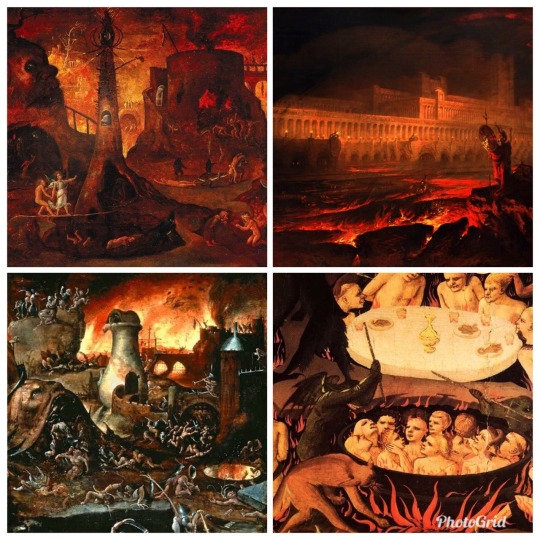
So, with this visual in mind, this is what you immediately relate to Hell, as a space, in Star Wars:
In the PT, Geonosis (ep 2) and Mustafar (ep 3). You have the fire, the dismemberment (assembly line, C3P0; Anakin loses an arm; Anakin loses both arms and legs and gets burned to a crisp), the psychological and physical suffering, the heavy coded color palette... Visually, Mustafar has been conspicuously designed to look like an archetypal Inferno. It is, after all, supposed to be the lowest point of the saga, the Fall, echoing Dante’s first part of his journey.

In the OT, with Bespin (ep 5) and Jabba’s Palace (ep 6), the visual imagery is more subtle, with some surprising twists and subversions.

Bespin is very interesting because it starts visually as a celestial place, normally coded as Heaven. But this is the place of treachery, and entrapment, which is already suggested by the color coding of the place as the MF lands on Cloud City:
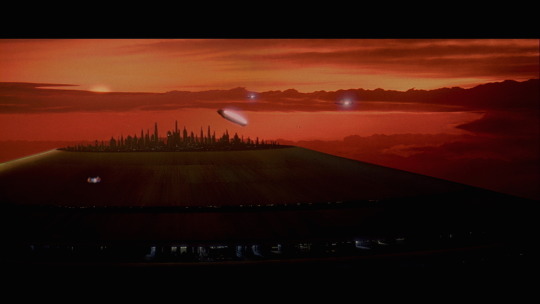
It is a place of betrayal for Han and Leia, sold by Lando to the Empire; where C3P0 is, once again, in the same installment as Trilogy 1, dismembered; where Han is tortured and frozen in carbonite; where Luke is cornered by Vader, loses a hand, and gets the big reveal; a place of psychological and physical pain. Note that there are very few table/dinner scenes in the saga, so this one becomes the Star Wars equivalent of the Last Supper with Lando as Judas, and Han turning into a sacrificial victim.

Jabba’s Palace, is, in my mind, the most interesting Hellish place of the saga. Visually, it does not look like the glorious operatic Hellfest of Mustafar, but it is actually a quite exhaustive take on sin and Hell as depicted by Dante. First, you have, quite as in the poem, two characters (C3PO and R2D2/ Dante and Virgil) entering a dark place to journey into the world of sins and punishment, and who are reminded, at the beginning to “abandon all hope”. This is C3P0 realizing that their master has “offered” them to Jabba as a gift. And what a wonderful and brilliant embodiment of the 7 deadly sins Jabba is!
Sloth and Gluttony

Pride
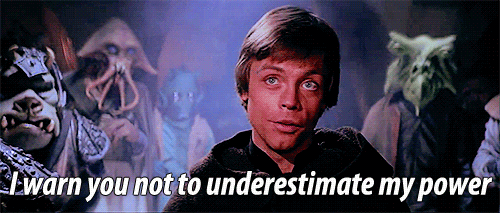
Greed
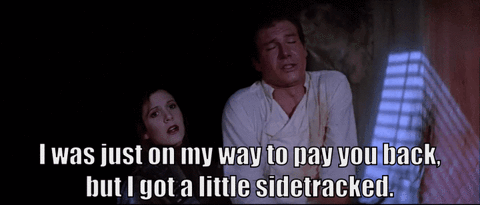
Lust
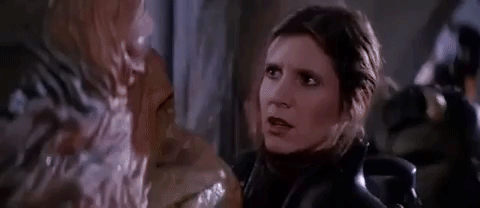
Anger
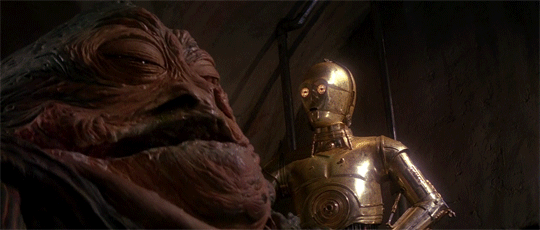
And envy, since when he sees Leia with Han he “covets” her.

Jabba’s Palace is quite the Pleasure Palace of all sins, between the boozing, singing, dancing, lusting, and killing people for entertainment. You can add to that the torture that he inflicts to the droids (again, dismemberment), the Rancor that is the equivalent of Cerberus as a Dog from Hell (his tamer’s reaction to its death is like that to the loss of a beloved pet), and the pit of the Sarlacc, which promises “ a new definition of pain and suffering as you are slowly digested over a thousand years”, so exactly like the promise of Hell to the sinners who are tortured forever... Jabba, and his palatial Hell, are very interesting because, for once, they are unrelated to the Empire and the schemes of the Emperor. This reminds us as the audience that Evil can take many forms and can often be found quite close to home, which sounds even truer in Luke’s case since Jabba’s Palace is on Tatooine, his home planet, and incidentally, that of Anakin/Vader’s as well. Jabba’s Palace was a bold interpretation of Hell. It is also very telling that all the characters (including Lando, in a rehabilitative process) are living the experience of Hell in Jabba’s Palace collectively, all facing the trials and overcoming them together. So it was not a one on one archetypal duel, the hero facing the villain.
In the ST, there is still of course ep 9 to reckon with, but in the meantime, we get mostly the Jakku opening scene, Starkiller base (ep 7) and the Supremacy and Crait (ep.8)...

We seem, at first glance, to return to a more litteral interpretation of Hell, more in the line of the PT than the OT, with flames, fire, smoke, the red and black color palette. But Hell, here, takes a "carry-on” form. It is less associated with a place than with a moment. Moments of Hell are created on different places, and are usually associated with the presence of Kylo. Hell is a place created by the characters. Like a bat out of Hell (his very distinctively shaped shuttle), Kylo brings Hell along with him, meaning that we have moved from a scenery, a background, to a more psychological interpretation of Hell. The inner turmoil that is tearing Kylo’s apart, his own inner Inferno, is released out on different places: the Jedi Temple, Jakku, Takodana, Starkiller, Crait...

The only place that exists as Hell in itself is possibly the throne Room on the Supremacy, and again, as mentioned before, this is movable Hell, since it is built on a ship...

Another character who seems closely associated with Hell and its representations is Finn, which puts him again in close relationship with Kylo (check the links between the two characters here). The experience of Hell on Jakku in the opening scene is lived through the eyes of Finn. On the Supremacy, in parallel with Kylo and Rey’s hellish experience in the throne room, Finn is here again also facing the Inferno, which takes a very litteral form as Phasma is sent to a fiery chasm (and “hopefully” this time around her death).

There is thus an interesting progression in the saga. From Hell as something very operatic that reflects the characters’ inner turmoils in the PT, but also exists visually on its own ; Hell as a place of trial for the characters, sort of to test their mettle in the OT; Hell as a place that comes from deep inside the characters’ pain and conflict in the ST and can appear at virtually any place.
There is also a recurring theme about Hell and what it brings to the characters in terms of love and romance in specifically each 2nd installment of the trilogies. In every trilogy, the characters find love or admit love at the gates of Hell: Anakin and Padmé on Geonosis as they are about to be sentenced to death; Han and Leia on Bespin before Han is frozen in carbonite; in the throne room scene through the duel and Kylo’s botched proposal, and on Crait when Rose admits her love to Finn. Love at the gates of Hell has quite an Orphean, poetic quality, admittedly... Twice, as for Orpheus, it is about love found and lost: for Han and Leia, and for Kylo and Rey... It can also echo the idea that, as Dante put it, “the path to Paradise begins in Hell”. Love has to be found in Hell of all places in order to lead the way to Paradise.

Not always in obvious places... “Hoth” as Hell
Hoth is a peculiar case. I do believe that it can qualify as a possible Hellish place... for one particular reason... In Dante’s Inferno, the very bottom of Hell, the place where Satan resides, is not a fiery pit, but rather a lake of Ice.

The first depictions of the Devil were not that of a red demon, but rather a blue angel, which for some time associated the devil with cold and ice, as depicted in this 6th century mosaic from a basilica in Ravenna (Italy):
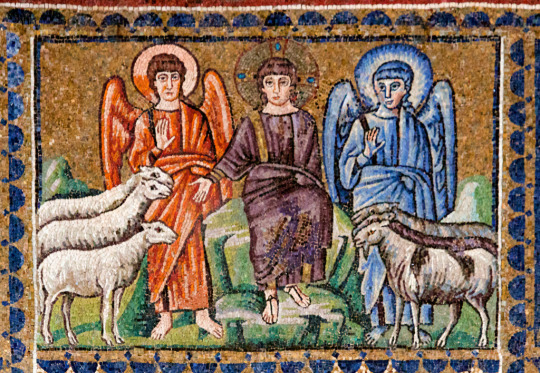
So, taking a page from the history of the devil, ESB starts on a planet that is barely a haven (pun intended) for the Rebels. The middle chapter of the OT is really the “Hellish” chapter, from the opening on Hoth all the way to the Bespin finale. And I particularly appreciate the way they designed places that are supposed to symbolize Dante’s Inferno without once playing on the usual clichés: the “Hoth” (the word always struck me as odd) planet of Ice, and the celestial Bespin. Like Satan is trapped in ice in Dante’s poem, the Rebels are effectively trapped, paralyzed on their icy planet (and I am not hinting that the Rebels are evil, but rather that they fnd themselves caught up in a form of Hell). And they also end in a trap on Bespin, with Han this time literally frozen. Vader, the representation of evil here, is thus not sending Han (and possibly Luke) to a fiery pit of lava, but to a place that freezes them. Back on Hoth, this is a place where the rebels are hardly sheltered and live under constant threats of death due to the terrible climatic conditions or hostile hungry creatures. Note that when Han goes to get Luke, this is what he says:
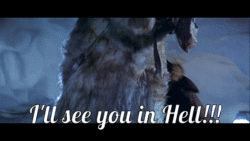
This is rare enough as an occurence to be highlighted. To my knowledge (feel free to pitch in), there are only two other instances where Hell is mentioned in the saga: by Uncle Owen in ep 3 ( “Well, if he doesn't have those condensers on the south ridge fixed by midday, there'll be hell to pay” ), and in episode 7, when Finn utters the infamous:
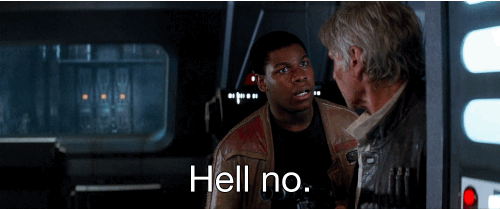
Finally Hoth can work as Hell notably because of the wampa figure, which rightly features among the potential satanic or hellish creatures in the very long list of bizarre Star Wars creatures.
Minions of the Devil, Evil Eye, and Satanic Creatures
Just like Hell as a space, some creatures are right in your face Satanic, or meant to embody evil. In the OT, ep 1, this is Darth Maul’s sole raison d’être.
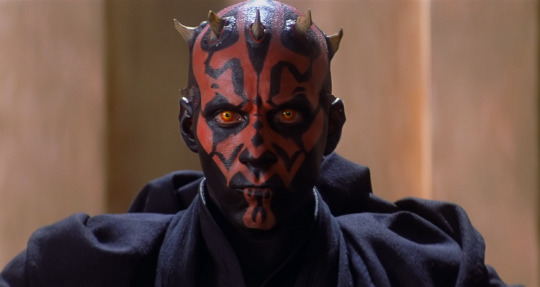
In this interview with Bill Moyers, this is what Lucas has to say about him:
BILL MOYERS: When I saw him, I thought of Satan and Lucifer in “Paradise Lost.” I thought of the devil in “Dante’s Inferno.” I mean, you’ve really — have brought from — it seems to me — from way down in our unconsciousness this image of — of — of evil, of the other.
GEORGE LUCAS: Well, yeah. We were trying to find somebody who could compete with Darth Vader, who’s one of the most, you know, famous evil characters now. And so we went back into representations of evil. Not only, the Christian, but also Hindu and Greek mythology and other religious icons and, obviously, then designed our own — our own character out of that. (...) A lot of — a lot of evil characters have horns. It’s very interesting. I mean, you’re trying to build a icon of evil, and you sort of wonder why the same images evoke the same emotions.
Ok, so basically, as avowed here, they just wanted a very visual embodiment of evil, something that could rival Vader in ep 4. Except that, as iconic and mesmerizing his look was, he didn’t say much, didn’t do much except jump about (indeed beautifully), and we know nothing about him, his motives, his purpose. Looking evil does not make for a great villain. And we knew this was not the big bad guy, just a henchman...So, not Satan, but a minion of the devil. And there are plenty of other aliens that dress the part just as well. Take for instance that cute as Hell guy from episode 4, found in Mos Eisley cantina:

He sure looks the part, complete with horns. He is just a cameo, though, to add to the list of nightmarish creatures from the cantina. To Luke and to the audence they were meant to be scary, shady, and strange. Were they truly evil? Obi-Wan had warned Luke: “You will never find a more wretched hive of scum and villainy”. So, I guess, yes? But this is also where they found Han and Chewbacca, and despite shooting Greedo first, Han turned out to be “nice men”. So maybe Satan horny guy would have been chummy on second thought?
Another interesting creature with horns is that one:
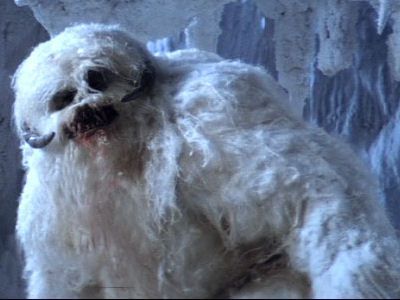
This is not a minion of the Devil, he could almost past as a furry fuzzy yeti. But the wampa, from planet Hoth can work as a hellish creature. It’s got the horns, it captures Luke, and threatens to eat him. Interestingly each first installment of the saga presents a scene where the heroes have to face creatures that seem to come straight from Hell and threaten to devour/eat the heroes: the aquatic monsters from the core of Naboo (note that Anakin IS NOT there), the creature from the trash compactor that attacks Luke, and the Rathtars that run loose on Han’s vessel and almost get to Finn... A reminder that Hell can take many different forms. And, if you think about classical representations of Hell, the Devil is often seen as devouring his victims:

Of course, you can also interpret these creatures, devouring exclusively men, as a representation of the threatening female mother/genitalia (vagina dentata) or you can think about the belly of the whale in Jonah’s story and take it as a rebirth... Talk about rebirth to Bobba Fett or those Kanjiklub dudes...
Other specimens that threaten to devour the heroes, and could be viewed as possible Hellish creatures:
The nexu and the acklay in AOTC

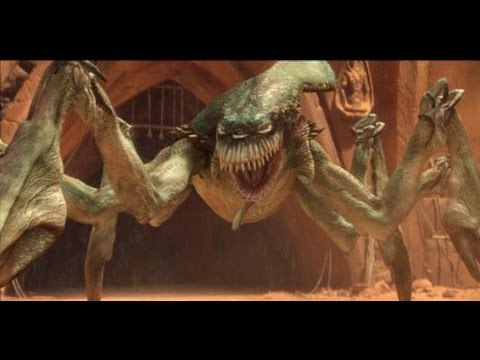
The space slug in ESB

The Rancor and Sarlaac in ROTJ


Not to mention the most dangerous of them all:

Yup, without the help of powerful magic (or snacks), this carnivorous savage furball will hunt you down and feast on your flesh!!! Need any proof besides Han tied up to get BBQed? They even did a Forces of Destiny episode where Leia was saving the lives of innocent stormtroopers about to become dinner:

Joke aside (for you Ewok lovers), meeting wild animals (possibly in a forest, I see you, damned Ewoks!) is also part of Dante’s journey to Hell. At the very beginning of the poem, before starting his descent, Dante is attacked by three wild animals: a leopard, a she-wolf, and a lion. With just a bit of a stretch, you can find this idea in the arena of Geonosis with the three alien beasts set upon Padmé, Obi-Wan, and Anakin.
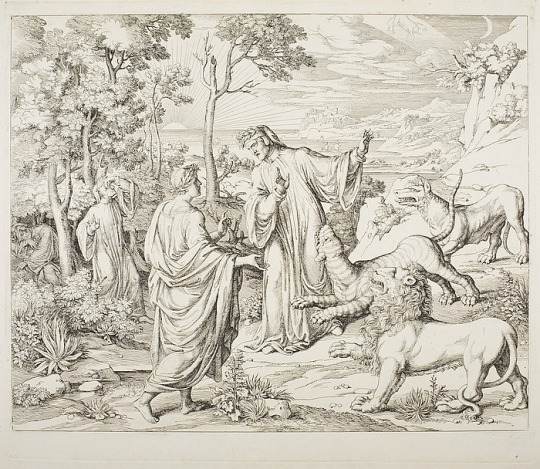
The first two trilogies seem to play with the devouring beast trick more consistently than the ST which just offered the rathtar. Devouring beasts were conspicuously absent from TLJ. Even though there was the shadow of a threat through the gigantic sea creature that roamed the seas around Ahch-To, the animal remained distant. On the contrary, animals were feasted upon: the porg, the fish, the milk from the Thala siren, which was a strong departure from the usual trope. It will be interesting to see what episode IX offers in that scope, but if the devouring beast remains absent, I think it will go along the line that I already suggested about Hell. The devouring creature is no longer an OUTSIDE/OUTER threat to the heroes. Rather, the devouring creature, the one that can consume you inside and out, is WITHIN yourself, in your heart and soul. Moreover, the devouring beast in TLJ was also the role taken by Snoke on a symbolic level, as an echo to Palpatine who preys and feeds on people’s suffering and weaknesses.
I would like to come back to the Dianoga from episode 4 though, because, on the screen, it does not appear as a toothy fearsome creature, but as an eye. The concept of the “evil eye”, that is to say the idea that a mere glance could curse you and bring you harm, can be found in many cultures throughout the world. It is probably a corollary of the idea of the omnipotent everseeing eye of God. The evil eye is not necessarily associated with the Devil himself, it usually comes from a person who is envious. Nevertheless, in The Lord of the Rings, Sauron, who is Evil incarnate, is materialized as an Eye, red, fiery, reptilian shaped. Equivalent “evil eyes” can be found in Star Wars. It can take the form of just one eye, as with the Dianoga, the gatekeeper’s device in Jabba’s Palace, and more interestingly, Starkiller base, which, with its cannon, looks, especially on the posters, like a one-eyed monster and brings new massive meaning to the notion of “if looks could kill”...But it can also be materialized in the evil Sith eyes of Maul, Anakin, or Palpatine. But note that Anakin’s evil eyes come and go, and that not all the villainous characters get the evil eye treatment: it never shows up in Count Dooku, Snoke doesn’t have them, and Kylo never has them either...
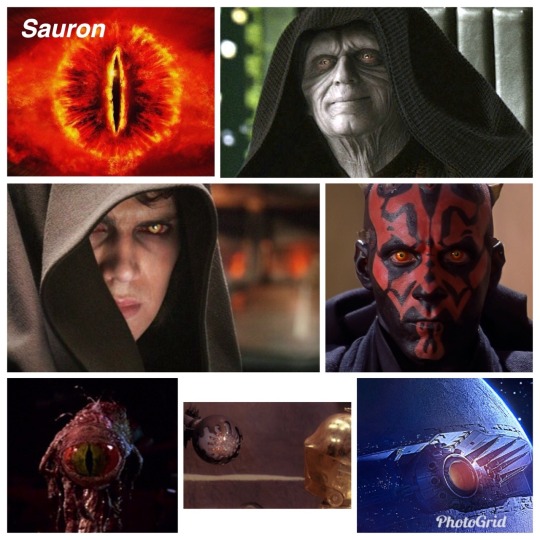
Who’s boss? Satan, Lucifer, and their Legions
As we have seen, there are many possible Hellish creatures in Star Wars, but, like Sauron’s ring, is there one to rule and bind them all? There is an important divide to mark here, a dual personality in Evil, that echoes the very way the figures of Lucifer or Satan have been evolving and developed. Most people now tend to fuse the two, but they can be viewed as two rather different entities. As this article sums up:
1.Lucifer is the highly favored angel created by God whereas Satan is his name when he was thrown away from heaven. 2.Lucifer is an angel of God whereas Satan is the name of the devil. 3.Lucifer is not the exact opposite of God whereas Satan is a name that pertains more to opposition. 4.Lucifer has a physical form whereas Satan does not have any.
Lucifer’s name comes from “the carrier of light”, an essential idea in the scope of Star Wars, and in this respect, Lucifer’s embodiments can be found in Anakin and Kylo. Anakin, like Lucifer, is a creature that comes straight from the highest power (God/the Force), and is the chosen one, the favorite, the most beautiful of all the angels. In his casting of actors for young Anakin, George Lucas picked a blond blue-eyed boy with cherubic potential (who incidentally is the only one of the saga talking about angels), and a hot up-and-coming young actor. Anakin is designed to be attractive. Like Lucifer, his tragic flaw is also his pride and hubris, and his desire to play God, which shows right at the beginning when he boasts himself of being the best pilot (he has never won or been in a podrace before) and the fact that he has designed, on his own, a sentient character (C3P0). Anakin rebels to the Jedi Council the same way Lucifer rebels to God: like angels he can’t marry or father children, he is not allowed the rank of master and must keep on bowing down to others while being better than them (Lucifer and the mortals). Anakin is clearly portrayed as a fallen angel, who, like Lucifer is punished and sent to the visual fiery Hell of Mustafar, and encased forever in his own personal Hell, the loss of the woman he loved, and probably endless physical suffering in the persona and armor of Darth Vader. But does Lucifer become Satan? Even though Vader was a striking embodiment of evil and a mesmerizing villain, he was immediately presented in ANH as a henchman and not the main boss. Even Leia was not afraid to tell it as it was:

And he appeared very subservient in front of the Emperor, which disqualifies him, in my view, as Evil incarnate. Vader is NOT the boss. This is the greatest irony about Vader: as a little boy, enslaved, he dreamed of living a free life, and he ended up bound up forever to his master, as well as to the apparatus that maintains him alive. You can call that survival, but this is truly a pathetic life. Though Milton chose the name Satan for his poem, his character is actually closer to Lucifer, the Fallen Angel, a tragic figure with undeniable seductive appeal through his intelligence, his infectious and passionate speeches, his sadness and torment, which make him, arguably, the perfect “anti-hero”,a romantic figure. Milton’s Satan claimed that it was “better to reign in Hell than serve in Heaven”. Maybe that was Anakin’s idea, but he never got to reign, even though the thought apparently stuck with him all these years, from his initial offer to Padmé to his offer to Luke to “rule the galaxy” together.
Enters Kylo, who presents striking similarities with Grandpa Vader. Like him, as a child he gets to struggle with a tremendous burden: Anakin is set out as the “chosen one”, Kylo as “the legacy child”, both with “raw, untamed power” that is unknown to any other Force sensitive, which makes them the beloved of the Force. Like Anakin, Kylo’s character is designed to be seductive, wavy hair and shirtless scene included. Like Anakin, he is a fallen angel, and his patricide aligns him with Lucifer’s attempt at defeating God (aka the Father). Kylo is not immune to pride or hubris either, but just like Anakin, he also finds himself ironically in a subservient position. Seductive in their youth, they both don the costume of evil and its outer signs (black, fiery red saber, satanic crossguard for Kylo, dehumanized mask), but the main difference is that evil has consumed physically Anakin. Vader is the ONLY persona he has left to survive, whereas Kylo merely plays the part. He is still very much human, and very much Ben Solo, as Snoke keeps reminding him.
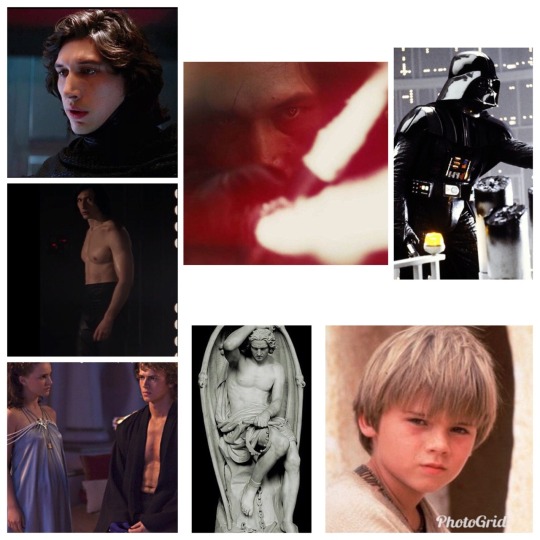
Both men have been manipulated since childhood by an older man/humanoid who has twisted their minds and hearts and finally gets them to contract a Faustian pact that -as all pacts with the Devil- never delivers. In both cases they do not become more powerful than they were before, and the price must be paid with the blood of their families/loved ones.
If we look at the distinction between Lucifer and Satan, Vader and Kylo can appear as the physical manifestation of Evil, ie Lucifer, the fallen angel, whereas Palpatine and Snoke, who incidentally most of the time appear under a holo form, are more like Satan, the ghost of Evil who needs to borrow/possess other physical forms to engineer his evil deeds. As French poet Charles Baudelaire penned in the 19th century (and quoted from in Th Usual Suspects): “ the loveliest trick of the Devil is to persuade you that he does not exist”. So both Snoke and Palpatine rely on holo forms, traveling, remaining away, hiding in the shadows or under a cloak. Even though the audience (who is familiar with the OT) know from PM that Palpatine is the elusive Darth Sidious, the Jedi Council is unable to identify him through 3 full length movies (!!!!). Like the Devil, he is the one whose very existence is constantly doubted, hiding behind different forms such as the Federation ViceRoys, Darth Maul, Count Dooku, General Grievous, finally Anakin/Vader, a form of demonic possession if ou will. Even Padmé and JarJar become hosts to Palpatine’s infectious powers, as they innocently do his bidding and become his puppets in the Senate. In the OT, the Emperor was conspicuously absent in ANH, and appears for the first time solely as a hologram in ESB. Disincarnated, the Emperor is the best embodiment of the spirit of Evil, nowhere to be found, and thus potentially everywhere, in his henchmen, but above all in the very satanic notion of his “legions”, aka the stormtroopers. Indeed, in Mark 5:1-20, Jesus exorcizes a man possessed by a demon and when asking the demon his name gets this all-too famous answer: “My name is Legion,” he replied, “for we are many”. Whereas the Emperor and Snoke in TFA remain hidden, the galaxy -and the screen- is filled with their legions, droid army, army of clones, stormtroopers, disposable, replacable...

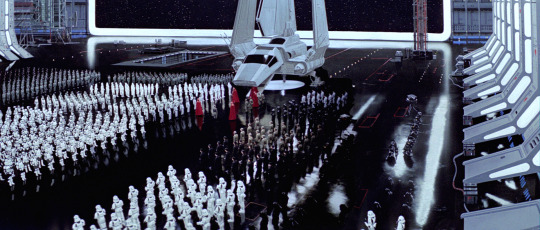
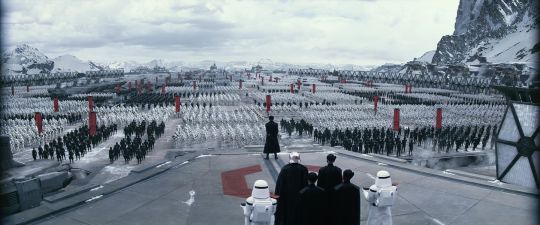
And indeed, when the Empire collapses, the First Order rises right away, evil ready to take another form, moving effortlessly from Palpatine to Snoke... When the figures of Palpatine and Snoke are revaled though, it is with all the usual Satanic codes and paraphernalia. In the PT, Palpatine gets the creepy treatment, with the maniacal laughter, the hooded robes, the evil eyes, the blue devil with horns at his side, the red room, AND the very not subtle art flair in the background that looks like a depiction of Hell:

In the OT, he gets the red guards by his side, and the spider web motif of the Death Star in the background.
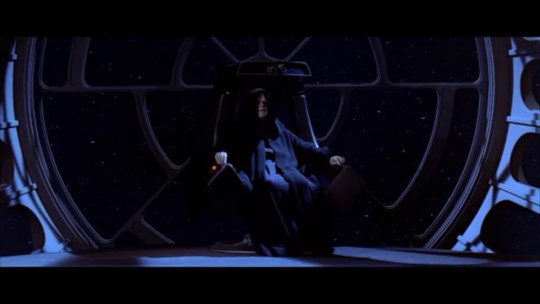
As for Snoke, he gets Satanic garrishness through red and gold, in the throne room scene.
Yet, both these satanic figures get defeated eventually, and, according to some critiques, rather quite easily. So what’s the point? Well, the point is how and by whom they get defeated in the first place! Every time it is by the Lucifer figure, ie Anakin and Kylo, the ones that were seduced and corrupted, highlighting once again the dual nature of evil, and meaning that evil is not something that is supposed to be found OUTSIDE of our nature, but WITHIN. Every time, the fight with Evil is first and foremost a fight with ourselves, our very nature. So it comes down to each and everyone to defeat the source of evil, no hero can come and do it for us. It is very important and revealing that neither Rey nor Luke were the ones actively killing Snoke/the Emperor. The “villains” have to become the agents of their own redemption. Even if this redemption is made possible through the love they feel for the heroes ready to die for their rescue.
It is even better that Snoke died earlier in the story of the ST than many had expected before. Because it forces us to question the nature of evil. It is easier and more comforting to lay the blame and point fingers at the very obvious figure of evil, the Satanic paraphernalia, the scarecrow, the snoke and mirrors if you will, as in The Wizard of Evil. As the obvious villains, Palpatine and Snoke serve a function: they are the gold villainous standard to which we are asked to compare our resident other villains, Vader and Kylo. And, of course, the very fact that Snoke and Palpatine are indubitably irredeemable means that, logically, the other two are indubitably redeemable.
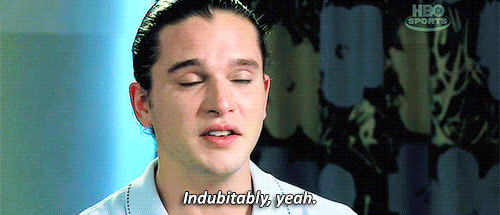
The position that Kylo finds himself in at the end of IX is a first, though. Vader did not survive his master, but again, he was too far gone for us to imagine him with a full redemption arc. He could die, but he could not be reborn. With Kylo, the potential is still very much in the open. What Kylo finds himself facing after defeating his inner demon (aka Snoke) is actually what remains after the fall of the scarecrow : the mundanity of evil (as Hanna Arendt called it). I would not necessarily call Hux mundane, but, just like the officers from the Death Star in ANH, they are not supposed to be the big “in your face” Fairy Talish villain. They are the legions, the brainwashed masses, the military honchos, the war profiteers, the obedient soldiers... Once the curtain is pulled (or burned down in the throne room scene), this is the harsh reality of evil that remains: the Huxes, the Tarkins... Yet, even there, hope remains. In introducing the character of Finn, the ST shows that, from within the very masses that represent the legions of evil, change can also come. The ST gives to the mundanity of evil a potential redemption. I was actually stunned when reading the Junior novelization of TFA by the importance given in chapter 1 to Finn as FN-2187 and his interactions with his comrades, who are given nicknames, voices, and an identity. We know that a scene was deleted in TLJ with more of these interactions. I wonder if episode IX is not going to be more straightforward about that and show how Finn was not, as Phasma called it, a mere “bug in the system”, but a foresign of deep structural changes...Fighting Hell and Evil is not just the stuff for mythical heroes facing dragons and monsters, it is, even in Star Wars, an individual quest (Anakin, Kylo), and something even a stormtrooper, or a nobody, can fight and possibly win.
If we go back to Dante’s Divine Comedy as a literary influence, we must remember that the progression is that of a descent followed by an ascension: first into the deepest pit of Hell, then up through Purgatory, to finally ascend into Heaven. Obviously, the purpose is supposed to be uplifting. It celebrates Redemption through the power of Love, and Faith in God. As much as a physical journey, it is also, of course, a spiritual journey. Something that resonates deeply in the star Wars saga. If each trilogy contains elements here and there, places of Paradise, places of Purgatory, and places of Hell, in order to make sense with the different mythical and religious themes embedded so far, the saga as a whole needs to follow the same path. So the PT is about the trip to Hell (Anakin’s fall), the OT can work as Purgatory as it is very much about expiation, cleansing, and purifying, and yes, normally, the ST is supposed to be about a spiritual ascension, and the redeeming power of love. In Dante’s final vision, women (through the Virgin Mary and Beatrice) and their compassion play an important part. It seems like women are taking a bigger part in the ST. And the last lines of Dante’s poem are really noteworthy in the scope of the saga as a whole :
But by now my desire and will were turned,
Like a balanced wheel rotated evenly,
By the Love that moves the sun and the other stars.
We could argue that the PT is very much about desire (Anakin), and the OT very much about will (Luke). And, in a way, the ST is very much about what happens when will and desire have to co-exist and balance each other out. Rey and Kylo are undeniably a mix of both. And, it is my personal belief, like so many other fellow bloggers, that the point of the saga is to be, like the final line of Dante’s poem, about balance. And I am quite partial about this idea that love will move the sun and the stars... like the Force. Moreover, when reading the quotation from The Journal of the Whills in the novelization of TFA, something really struck me: the “refined Jedi sight”. In Dante’s final vision, an emphasis is definitely put on eyesight, and the way eyes become “crystal clear”. Between Rogue One and TLJ, crystals seem to take more and more importance in the conclusion of the saga...
Remember, the path to Paradise is through Hell, and, guys, ascension is on the way . Buckle up!
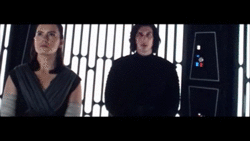
#reylo#reylo fandom#reylo fam#reylo meta#star wars meta#star wars parallels#paradise and hell in star wars#hell in star wars#satanic creatures in star wars#kylo and anakin
454 notes
·
View notes
Text
Star Wars: The Idiot Plot Strikes Back
So thanks to Netflix, I finally got around to seeing The Last Jedi. I wasn't boycotting it or anything. It's just that my wife and I have a house now, and as a result, much less disposable income. Seeing movies in the theater can be an expensive way to spend the evening, so we tend not to do it unless we're 100% sure we'll enjoy the ride.
Frankly, when it comes to The Last Jedi, I'm glad we saved the money.
And no, I'm not some raging misogynist who can't stand women in "muh Star Wars." I enjoyed The Force Awakens for the fun nostalgia trip it was, and I thought Rogue One was the best Star Wars film since the original trilogy. My gripes with The Last Jedi have nothing to do with the politics of diversifying the cast. My gripes have to do with the fact that it was a boring, muddled mess that hinged on an "idiot plot" for the majority of its suspense.
Not to say the movie was without merits. Overall, it was visually stunning. The bombing run against the dreadnought might be my favorite space battle in the entire series. Some of the individual set pieces, in particular the throne room battle, were outstanding.
The problem is none of those individual pieces can make the whole stand together.
Case in point, the "idiot plot." For those of you unfamiliar with the term, an idiot plot is a plot that depends on one or more of the characters behaving stupidly to create the central problem. If the characters were smart or competent, then the problem would either be solved immediately or would never have come up in the first place.
Most of the suspense in The Last Jedi is driven by the fact that Vice Admiral Holdo refuses to share the plan with Poe. This leads to Finn and Rose taking on a secret mission, Poe leading a mutiny, and the hired hacker selling the Resistance's plan to the First Order. The First Order then blows the escaping transports out of the sky, slaughtering most of the Resistance and necessitating Holdo's suicide run against Snoke's flagship.
Oh. Um... Spoilers, I guess.
The thing is, Holdo not revealing her plan is stupid.
And yes, I understand this was done partly to give Poe his character arc. After disobeying orders and incurring heavy casualties on the dreadnought run, he needed to learn how to accept authority and work as a part of a larger team. I can even understand the need for Holdo to take him down a peg and assert her own authority.
But no commander worth a damn would do so at the expense of withholding the operational plan from her own troops. She's depending on them, and much more importantly, they're depending on her.
Yes, Holdo is a superior officer. No, she doesn't owe a long and detailed explanation to a junior, especially not one who is demanding her time on a busy command bridge.
But real world talk: Trust is a two-way street in the military. A commander needs to trust the troops to do their jobs, and the troops need to trust in the commander's abilities. And rank, contrary to what you'll see in movies and on television, does not automatically convey that trust. This is especially true in combat.
When Poe demanded to know what the plan is, the exchange should have gone something like this:
POE: "Admiral, you have to tell me. What's the plan?"
HOLDO (giving him a dismissive look, and putting special emphasis on his newly-reduced rank): "Your section leader has all the details. He or she will brief you, Captain Poe."
POE: "But I..."
HOLDO (more firmly): "There is a chain of command, Captain. I expect you to use it. Now get off my bridge before I have you demoted to scullery boy."
This would have immediately established Holdo as a strong leader, one who isn't going to take any bullshit from her subordinates. It would also have established that there is a plan, and that Poe doesn't get to be a part of the decision making process again until he matures enough to be both a leader and a follower.
In short, it would have built that two-way trust.
Of course, if you make that one change, the entire middle section of the movie falls apart. Poe is briefed on the plan, so he doesn't mutiny. Holdo isn't kept in the dark about the tracking device, because that information goes back up to her through proper channels. The side mission either never happens (because it's not necessary to her plan), or it gets full approval and enough personnel to pull it off. The majority of the Resistance survives. Holdo still makes her sacrifice, but to lead the enemy away.
Rather than come up with set-pieces and adventures that would have flowed organically from the characters making the smart choice, the movie settled on trying to sell us a Vice-Admiral who's not only too smug to share her operational plan, but also has no idea how to handle an out-of-line subordinate. It then expects us to believe that she's a brilliant and respected battlefield commander.
Even worse, The Last Jedi asks us to see Poe's mistrust of Holdo as a character flaw, in spite of the fact that mistrust is exactly the reaction her "leadership" style would inspire in any sane soldier. It asks us to believe that Holdo was worthy of his trust all along, and he was just too hotheaded and cocky to see it. It asks us to believe that, in witnessing her sacrifice above Crait to save the remains of the fleet, he has seen the error of his ways, and has grown and matured because of it.
A good message, one that was sadly undercut by making Holdo an uninspiring, ineffective buffoon.
There were plenty of other problems, too.
1. We really didn't see Rey struggle with learning to use the Force, so her ending payoff felt unearned. Lifting the boulders to clear the path would have been more dramatic if we'd seen her try and fail to do that on Ahch-To. Instead, her biggest dilemma was whether or not to believe Luke Skywalker, legendary hero of the Rebellion, or Kylo Ren, the man who murdered his own father while she watched. I can buy her not believing Luke. I can't buy her believing Kylo.
2. Rose stopping Finn's suicide run was incredibly stupid, and her actions would absolutely have killed everyone inside the base if not for the arrival of Astral-Projection Luke (something she had no idea was going to happen). She dooms her friends and allies to die, and then has the complete lack of self awareness to talk about "saving what you love." My working theory is that she suffered a severe head trauma in the crash.
3. Leia Mary Poppins. 'Nuff said.
4. I hated Luke's arc. I just couldn't square the optimist who saw good in Darth Vader with the burnt-out cynic who contemplated murdering a sleeping boy. It smacked of subversion for its own sake, rather than natural character progression. I have more to say on the subject, but I'll save it for a dedicated post in the future.
All in all, it just felt like The Last Jedi was trying to be too clever. The filmmakers were so focused on undermining the audience's expectations, they neglected to tell a coherent story.
At one point in the film, Kylo talks about the need to "kill the past." While I wouldn't say The Last Jedi succeeded in that, it did manage to completely kill my interest in Episode IX, and the continuing adventures of Rey, Finn, and company.
That, in itself, was no mean feat.
3 notes
·
View notes
Text
Star Wars: The Last Jedi: Politics
So I’m FINALLY getting back to this after, as usually, letting myself get distracted with other things |:T Partly that was me wanting to do a rewatch to get my thinking on this issue in order, and then not having the time to before it left theaters(X| X|), but Anyway! I’m doing it now!!
Tl;dr: I feel like the details of the plot confuse and undercut its laudable messages, and that it furthers a sort of shallow, commoditized understanding of “rebellion” as a character trait/mindset rather than a political act, much like Rogue One.
Political Ethics
So like I said, the messages are good. The Rebellion is clearly presented as Good and the First Order clearly as Bad. The Rebellion is egalitarian, people-oriented, universalist(humans & nonhumans of all stripes are welcome, and there’s no visible gender discrimination), collectivist, and affirming of its members’ worth, needs, and initiative; these values deserve to be presented as Good. The First Order is hierarchical, object-oriented[1], exclusionary(no place for nonhumans; mostly filled with white men), aristocratic[2], and actively erases or ignores the individuality of all but its command staff[3]; these “values” deserve to be presented as Bad.
Unfortunately the plot focuses on the individual “heroes” of The Rebellion, an inherently aristocratic perspective[4] and, aside from the planetary evacuation, none of the Rebellion’s successes have a particularly collective feel to them. In certain respects this is necessary, Poe can’t start off understanding he has to think of the group first if learning to do that is his arc, but that’s a single character, and there ought to be a noticeable progression as he learns that lesson through the film; instead, he continues to make the same myopic mistake again and again until the very end. This mismatch does more than undermine the larger message; it makes it seem as if Poe’s actions exist to create drama in the film, rather than as part as a personal narrative, within a wider story. The presentation of Holdo is much better on this count, she’s almost always in a group, discussing and directing actions(that we aren’t privy to |:T), though unfortunately those are all distilled into individual moments for her, or antagonistically between her and Poe. One could argue that Poe’s increasing reliance on followers rather than his own actions --first Rose and Finn then what’s left of the pilots-- is meant to show him growing as a leader, but I find that argument unconvincing. Rose and Finn’s mission is a decision he makes on his own without consultation in secret in contravention of the collective’s decisions, and is explicitly presented as yet another “Heroic” mistake on his part. The Mutiny is similarly presented, and the collective aspect of it rest on a single scene, after which the focus moves back again to Poe. Something as simple as having Poe be with others, visibly leading them, in these arc-moments, or surrounding Holdo with bustle rather than just people, or showing extras accomplishing vital tasks, would have given the Rebellion a more collective, egalitarian feel. Instead, we get Poe taking the bridge on his own; Holdo standing up to Poe, alone; Holdo and Leia stepping out of separate smoke-clouds to stop his mutiny, alone; Holdo left on the bridge, alone, sacrificing herself for the collective.
The overall presentation of the Resistance/Rebellion adds to this confusion. The Rebellion/Resistance is supposed to represent the Galaxy and its people as they are, which is why its membership is diverse and why the oppressed like Rose and the children at the stables side with it. But the Resistance isn’t presented as a mass-movement: instead it’s a small handful of stalwarts Fighting the Good Fight, led by an even more select cadre of Heroes responsible for all their successes. It is more vanguard than expression of the common will, let alone defenders of a standing government which unites the galaxy. This desire to stack the odds against the “Rebels” --to emphasize their vulnerability, increase tension, and contrast their individuality with the dehumanized First Order-- ends up presenting the struggle for democracy and freedom as an elite endeavor. The common struggle for dignity, democracy, and freedom cannot be fought by a handful of mythic heroes; collectivist goals cannot be accomplished through elitist ends and avoid corruption into precisely what they fought against. Leaders and organization can and must exist to direct action and prevent subversion, but to present them AS the movement and the movement as alone and abandoned -as the “spark of hope” that “will ignite the galaxy”- is to present the people of the galaxy as the passive object of their will rather than as their partners in the struggle and society.
Which leads into a more delicate question about TLJ’s politics: people, sacrifice, who dies, and who matters. There are four events that focus and turn on these questions, in two mirrored pairs: Poe’s distraction/bombing run and Luke’s illusion; Holdo’s kamikaze and Finn’s attempted one. Structurally these are a bit imbalanced as three take place during or after the climax, and one at the very beginning of the movie. They are presented like this: Poe risks his life to distract Hux so the Rebels can escape, which is good, but then he needlessly risks, and loses, the lives of his pilots to blow up a dangerous ship, which is bad; Holdo selflessly commits kamikaze to save the Rebel transports and destroys much of the Order fleet, which is good; Finn tries to selflessly commit kamikaze to save the rebel base and destroy the Battering Ram, which is bad, but is stopped by Rose risking her life to crash him off course, which is good; Luke projects himself over galactic distances, knowing it will kill him, to delay the Order long enough for the Rebels to escape, which is good.
The message here seems to be that it is right to sacrifice your life for others in dire moments, and wrong to sacrifice the lives of others for your plans, which fits perfectly with the moral and political opposition established between the Rebellion and the First Order(and between Poe’s grandstanding and Holdo’s quite marshaling of the fleet), but the episode with Finn puts an asterisk on that. I am NOT saying Finn should have died; that’d have been criminal and derailed the whole franchise and ruined this movie for me. But I do feel like they could have handled that sequence better, or presented that attempted sacrifice with circumstances that more clearly explicated the ethical message. It must also be said that women are allowed to die and risk themselves for others far more often than men in TLJ. Given the central place of women in the film, Luke’s sacrifice, and that, as above, killing Finn off would be a Horrible Criminal Offense that I would gladly hemotoxin people over, I don’t think TLJ intentionally played into this trope of women being “naturally” more sacrificing, “giving”, and group-oriented than men, but it’s still a Bad Look. This is worsened by the writing of and around Poe; he’s never shown mourning the loses he caused, never blames himself, never questions his actions, never loses the regard of his crewmates or the fond forbearance of his commanders for his atrocious decisions. Nominally he is demoted but he’s still able to do basically whatever he likes and, if anything, his insubordination marks him even moreso as the future of the Rebellion(protip: this is nepotism, not institutionalized revolt). Out of all the bombingcrew and fighter pilots who die only one, Paige, is given extended attention and heroic treatment, and nobody aside from Rose even mentions her after her death.
And also: Holdo and the A-Wing Pilot were both Great, and I Loved Them, and why did you kill them, Rian Johnson, in a movie I mostly enjoyed???
Rose and Finn’s storyline was far more politically satisfying to me. Their escape is fundamentally a collective one(though making it a full-on prison break would have been nice for this); without the Fathiers, children, and BB-8(sigh, and DJ *eyeroll*), they wouldn’t have been able to get out. They free the Fathiers in the process of freeing themselves rather than using them to advance their goals. Moreover, Rose gets her chance to be part of putting a metaphorical fist through a town built on exploitation and the performative excess it affords. That the movie would take aim at wealth like this, implicating it in the fascist, ethnic-supremacy of the First Order(even rich non-humans; there is no ethical stock-trading in galactic capitalism), really surprised me; I just wish it’d aimed wider, at wealth in general, rather than at weapons-dealers. Though having said that, singling out weapons-dealers does have a particular salience to USian politics, so maybe that’s part of it. Anyway: the message is far clearer than in Poe’s sections, bolstered by the action, and they get a chance to throw barbs at a “both sides are bad” idjit on the way out, which: Very Satisfying ^u^
Rey’s story I didn’t really see as all that political but, thinking about it just now, there is one aspect of it that touches on morality and politics, and that is her desire to “turn” Kylo Ren. In Impermanence I went into the psychological reasons Rey may have had for wanting to do this, but it all lends itself to a political analysis as well. Rey’s attempt to turn a violent fascist is not, I think, a promotion of the “let’s debate them, guys” school of rhetorical critique. To begin with she’s entirely willing to throw down with him if he chooses his desire for dominance over his connection to other people(and does), and secondly there’s much less uncertainty for her in this equation than in real life. Rey can feel Ben’s uncertainty and doubt, his love for his family and the anguish he feels over hurting them, the truth of his conviction that he is a monster for doing it. He is, absolutely, manipulating her, and using her knowledge of his feelings to manipulate her, but it’s a fundamentally different situation than one where the only thing you really have to honestly assess another person’s intentions is their actions, and the goal their words are meant to achieve. Besides, TLJ is about a war with fascists brought on by a central gov apparently doing nothing to stop their rise; that seems more a promotion of confrontation than of “debate”.
Rebellion
The presentation of “Rebel” is my other big complaint. I don’t really think this will take very long. It basically has two parts.
The first is: these people ARE the government. Leia helped rebuild the Republic; all the soldiers, officer or grunt, are Republic citizens who must have learned about how to fight from Republic institutions(and if they have military academies, why wouldn’t they have a military?). There was the suggestion in TFA that they were secretly funded by the Republic. The First Order is a hostile, invading, outside polity defined, to the audience, entirely by its militarism and oppression. So what are the Rebels Rebelling against? The term “Resistance” is frequently used, but by the end of the film it falls away entirely for this “Rebel” label, which is taken as exemplifying their values, mindset, and situation. But again: they are fighting to defend a standing, democratic, egalitarian government. They are no more rebels than Union soldiers fighting Confederate traitors were. The Empire itself, based on what I know of the backstory, was a massive and short-lived break from the historic mores and institution of galactic society. There is little, if any, polity calling for the Empire’s return, and many worlds actively supported the Rebellion during the civil war. So why are they so few, the Order so many, and why does no one come to help them? All these decisions made to heighten the situation and amplify the heroism of our protagonists not only undermine the idea that the galaxy is behind them, but also pour into valorizing this “Rebel” label and marking these “Rebels” as the courageous conscience of an apathetic and passive world, but it is the First Order that is rebelling against the democratic government that galaxy has legitimated, and in the name of the very defunct fascist coup they help that government end. The Galaxy does not need to be saved from itself: it needs to be protected from the forces of oppression and exploitation.
The second is this, and it’s related. Rebellion is an act and, like any act, it’s morality is judged by its context: why it is done, what it is responding to, how it is done, and what it accomplishes. Rebellion, in itself, is absent of moral meaning. Yet we see here, just as in Rogue One, rebellion being presented as good-in-and-of itself, “Rebel” as a personal quality rather than an act(i.e.: Phasma: “you were always scum!” Finn: “Rebel Scum!”), and zero examination of WHO is rebelling in this situation, against WHAT, and WHY. “Rebel” and “Rebellion” are transformed from political actions with discrete content into brands for people to wear; to be more direct, into corporate logos for Disney to sell. This is fucked up and, in the political context of the US where murderous confederate diehards like Jesse James are STILL lauded as folk heroes, unhelpful.
Nitpicks
The rest of my quibbles are pretty unimportant and mostly have to do with effective worldbuilding, so I don’t think they really detract from the movie in any general way, or even for a general audience that DOESN’T get twitchy over how believable depictions of political and social order are on screen.
Here is a Convenient List of my Niggling Complaints:
where’s the Republic? It’s a galaxy-wide government built on a foundation of THOUSANDS OF YEARS of galaxy-wide democracy pre-dating the Empire and, while having its capital destroyed with all-hands would certainly sow chaos, it certainly wouldn’t make it disappear! In every system!!
Where’s the Republic Military??
If the Republic HAD no military other than the (unofficial) Resistance, then wouldn’t the sudden wealth of all these weapons-manufacturers just as the First Order’s ramping up its rhetoric be kind of... suspicious???
And why would a government birthed from a rebellion against a fascistic “Empire” disarm in the face of organized remnants of said Empire(led by another Dark Jedi, no less!) anyway????
Why couldn’t this story take place during an all-out assault on a confused and headless Republic+military, rather than with the Republic poofed suddenly out of existence?x5
The collapse of governments is chaotic on all aspects of society and especially commerce: couldn’t they have shown at least ONE person on Canto Bight freaking out about their portfolio, and all the deals with the Republic gov they had that have just disappeared?x6
So like I said these aren’t really BIG complaints, but they’re aspects of the film that make my political-history brain Itchy. Maybe they’re all answered in EU material but if they are: it’s kind of a bad idea to build movies on information that the audience isn’t going to have going in, and won’t get by watching. Anyway they BUG me --just like the Bombers for all their rhetorical importance BUGGED me-- in basically every aspect, and I just wanted to State that For the Record. States and Governments don’t vanish in a day, they influence and express the societies which create them, and they always leave behind survivors.
[1]putting its faith in tools(the Dreadnought, their Cannons, the Battering Ram) and surplus(large ships, numerous fleets, innumerable faceless legions).
[2]Everyone speaks with posh accents. Also: only command-staff is allowed to show their faces or include idiosyncrasy in their uniforms.
[3]And even their avenues of expression are supremely limited.
[4]A “Hero” is, necessarily, “outstanding” and possessed of “superior” qualities, whether physical or moral. To be a “Hero” is, by definition, to be “better than” and “above” other people, which is what aristocracy - “rule by the best/highest”- is all about. And Yes: meritocracy literally means the samething as aristocracy, so don’t let people tell you it’s a democratic concept.
12 notes
·
View notes
Text
Last Jedi positives and negatives, plus predictions for Episode IX!
Alright, enough time has passed and I think it’s okay for me to finally give my spoiler thoughts on The Last Jedi and predictions for the future (plus I haven’t had time to write something here specifically until now!)
Right out of the gate: I like The Last Jedi. I think I like it as much as The Force Awakens, but I like each film for very different reasons. TLJ took way more chances and was much more subversive than TFA, which I greatly appreciated. However, there are so many problems that I have with this movie. I know that sounds really negative, but here me out! I love Star Wars, but I also love movies. Upon first viewing I watched The Last Jedi as a Star Wars fan, and the second time I looked at it with a more critical eye.
Let’s get the problems I had with the movie out of the way first.
1) I hated everything that had to do with Canto Bight. Like, legitimately hated. It dragged upon the pacing and every time they cut back to it, I found myself checking my watch and hoping they’d go back to something more interesting. I thought its “message” was too on-the-nose and delivered poorly. It felt so prequelish and cartoony to me that I rolled my eyes more than once. I like Finn. I kinda like Rose. They were not serviced properly at all. Finn was one of my favorite characters and I felt like he was reduced to an ultimately meaningless side quest. Honestly, I look forward to fast forwarding through all the Canto Bight sequences once I get my hands on the Blu-Ray. And before you tell me the deeper meaning of the sequence, listen: I got it. I got everything that they were trying to say, but the execution didn’t work for me. It was too long, too. 45 minutes on that dumb planet felt like 90. Also, some of the effects look a little wonky, especially when Finn and Rose were riding those horse things through the city streets.
2) Leia’s Superman moment. It really pains me to say this because I miss Carrie Fisher with my whole heart and she gave a hell of a performance in this movie. But it was just to weird for me, seeing her fly through the stars like that using the Force. I’m glad that she used the Force but jeez, it was strange and took me out of the moment.
3) Snoke’s death. Alright, so this is a tough one. I love, love, love the manner in which Snoke died (more on that later), but I can’t help but worry about what this really means. The Force Awakens told the audience which questions to ask and what questions were important; one of those being “who is Snoke?” He was set up as this Big Bad™️ and was killed by almost nothing. Look, I know this whole movie’s deal was “subverting expectations” and being “unexpected”, but this is a mistake that the prequels had. Killing off your villains too early doesn’t give your main character a good motivation to keep fighting. Think about it: if Darth Maul hadn’t died and was the ancillary villain throughout the prequels, there would have been more emotional weight in Obi Wan’s journey (don’t @ me with that “but Maul was in the Clone Wars TV show!” Let’s keep the talk to movies, but I do love TCW a lot.) I think Snoke needed to be a driving force for Kylo Ren in his struggle with both the Dark and Light Sides. Clearly I don’t know what is going to happen in Episode IX, it could be the greatest story ever for all we know, but for now I thought the character of Snoke was, quite frankly, wasted. I felt no impact when he died, other than the impact that came with the rest of the scene. I wish we had known more about him, that’s all! One line of dialogue about who Snoke was or “he’s like, super crazy powerful with the Force because of X, Y, and Z.” I needed more from Snoke to feel any weight/impact when he was killed. What had already been presented to me about Snoke (which wasn’t a lot, I think we can all agree) was not enough for me. Maybe we’ll learn more about him in a book or a comic or in Episode IX.
4) Right, so where the hell were the Knights of Ren? Again, something that was presented as important to the audience in The Force Awakens and was not elaborated on. I think this- coupled with my previous ramblings on Snoke, the revelations about Rey’s parents, and some other story beats- show that there is a lack of a complete vision with this story. I appreciate the fact that Lucasfilm is letting storytellers tell their stories, and have creative freedom over projects (for the saga films, not the stand alones apparently). That being said, it didn’t feel like JJ Abrams and Rian Johnson collaborated and compromised as much as they should have. Look at Marvel; each story can stand alone but there is clearly an overarching story. I understand that this is “Rey’s journey”, but it would be nice if there was a supervisor (à la Kevin Feige) overseeing this saga. Yes, I understand that many feel as if the Marvel films are formulaic, but one must see that they’re still letting filmmakers tell their stories (see Thor: Ragnarok. That was 100% a Taika Watiti film.) It felt like there was a large disconnect between The Force Awakens and The Last Jedi. If the Marvel analogy didn’t satisfy you, let’s look at the original Star Wars trilogy. George Lucas did not direct all of those movies. He did not write all of them. But he was the head of story development, and they all felt connected and like there was one overarching narrative. These are just my opinions, mind you! For me, I wish that there was more connective tissue between 7 and 8 and that certain story threads weren’t dropped/disregarded.
5) This is a slippery slope, and not completely a negative, but sometimes...sometimes Rose didn’t work for me. Overall, I thought she was a good addition to the saga and Kelly Marie Tran is a DELIGHT, but her line delivery was a little rough and her one-sided affection for Finn fell completely flat. This was a super minor issue! Don’t hate me, please. If you loved everything about Rose, awesome! This movie is yours to enjoy and pick apart, and you should never change your opinions based on those of others. Live your life.
6) Ah, Luke Skywalker. One thing: I don’t believe for a second, based solely off of what we know about Luke’s character, that he’d ever consider killing his nephew. Just hear me out, please, I know this is a iffy subject for most fans. Specifically, I don’t think Luke would have ever turned on that damn lightsaber, even for a moment. I know we’ve seen Luke straight up MURDER fools (see Jabba’s sail barge) and we’ve seen him tempted by the Dark Side (see when he was tempted to kill the Emperor or when he was tempted to kill Darth Vader.) Almost killing Vader and thinking about murdering Ben Solo are completely different. Vader had actually done all those horrible things; Luke only saw a glimpse into the future of Ben Solo. One of Yoda’s chief lessons to Luke was that the future is always in motion. Luke would have had hope, he wouldn’t have thought (even for a second!) that killing the son of his sister and best friend would be a good idea. Luke would have spoken to him, Luke would have tried to make amends. Vader, Ben Solo, the Emperor, those drunk idiots on Jabba’s barge; all different scenarios. All in all, I didn’t agree with this decision with Luke’s character. Oh well, it’s not my choice, it’s not my story, as much as I would like it to be. I’m a Star Wars fan, and I love these characters so so much. Still, it’s okay to formulate opinions about things you care about.
7) I could live without DJ. Honestly I thought they wasted Benicio Del Toro’s talents. I think he was much more suited for either a Resistance official or Knight of Ren, not some stuttering Lando Calrissian antithesis. I get the lesson he taught to Finn about arms dealing, but his character got on my nerves. Maybe it was just intensified by my dislike for Canto Bight.
8) The plot device of “the characters didn’t communicate” is cheap. I am, of course, referring to Holdo not informing Poe about what she was up to. Was Poe a lower ranking official? Yes. Still, Holdo must’ve known that he was still one of Leia’s most valuable soldiers. She could have told him something! This could have avoided Canto Bight and cut down on the film’s long run time. This would have given a stronger relationship between Holdo and Poe, further showing how he will be trusted with the future of the Resistance.
Here’s a quick run-down of other things I had a problem with:
Hux was even more of a cartoon character, and it was annoying
The fact that Rose stopped Finn from sacrificing himself! It could've been a really powerful moment but she came in with an out-of-left-field message that doesn't mean anything because they had no chemistry! (And I'm not referring to the purposeful awkwardness; this is just them together in general.)
The fact that Poe said “big ass door”
Final Finn/Phasma confrontation, mostly because Phasma was still grossly underdeveloped and showing part of her face did very little to humanize her.
Luke throwing the lightsaber over his shoulder like the legacy of his father and his past meant nothing! I understand that Luke wanted to be left alone, but even he still had a heart. He should've taken it and grumpily walked away instead of throwing the damn thing so nonchalantly.
GEEZ, DID YOU ACTUALLY LIKE ANYTHING FROM THIS FILM?! Yes, yes, I like so much about this film! Let me explain all my positives!
1) That Luke and Yoda scene put the biggest smile on my face. That was bonafide Empire Strikes Back puppet Yoda! I love the message Yoda gave to Luke, I love how he bopped his former trainee on the head with his walking stick, and I loved how they burned the Force tree. Honestly, it’s one of my favorite Star Wars scenes of all time, I think. It felt so organic and genuine, and I loved every minute of it. That was the kind of moment and dialogue that makes me love Star Wars!
2) I loved that Rian Johnson TOOK CHANCES. He managed to keep my guessing through the movie and presented us with situations that expanded the Star Wars story. One of my biggest complaints with The Force Awakens (which is shared with many) was that it felt so familiar. I appreciate the Rian Johnson made this film his own. And yes, I liked the Force-projection that Luke did at the end (aka Force doppelgänger or whatever.) I lost it when Luke brushed his shoulder in his confrontation with Ben Solo. Gold. Pure gold.
3) The Rey/Kylo Ren team up fight is a top-five Star Wars moment for me. What a battle. Especially in a filmmaking perspective; the fight choreography was exquisite and the wide shots of them back-to-back taking on the Praetorian guards looked SO GOOD. Also, I was tricked into think that this was Ben’s turn to the light side, and was promptly misdirected. Nice job, Rian; you got me. What an emotional, rage-fueled battle. It shows us the obvious compatibility of the two, their interconnectedness, and the sad truth of their separation. You cannot have light without darkness. Somehow, in some way, those two- they complete each other.
4) Porgs. I am pro-porg. Porgs are friends, not food. Thank god they did not go the way of the Gungan.
5) We got a force-bond, people. Not gonna lie, this might be one of my largest positives with the film because it was one of my predictions that came true... Anyways, I loved every interaction of Rey and Kylo Ren. Even the shirtless scene, which was obviously just to show the audience that Rey could see him- it was only for this, nothing more, clearly. Still, these two are the heart of our story; our Skywalker and our Scavenger. The light and the dark. Yin and yang. Peanut butter and jelly. The dynamic duo, if you will.
6) There were some damn good space battles. This includes: the opening bombing run, Kylo Ren almost blowing up the Resistance bridge, the outmatched Resistance fleet trying to flee to Crait, Holdo sacrificing herself for the Resistance. I like my space battles. (Although, to be fair, the bombs “dropping” in space bothered me a bit. Oh well, screw physics.)
7) Amilyn Holdo is a good character. This is because I am bringing outside knowledge about her with me when I view this film, which makes her death more impactful. I do think it’s unfair to the audience at large when people say “if you only read the book this moment in the movie would be better.” I think that’s a little annoying; you shouldn’t have to read a book/comic to understand a character. The film should give them their due. Was Holdo, in terms of the film, a little underdeveloped? Yes. That doesn’t take away from the impact of her sacrifice and devotion to the cause.
8) There were a lot of good lessons in this film, including, but not limited to:
Failure is the greatest teacher
You can come from nothing and still be something
Your worth does not lie in your past
Forge your own destiny
Don’t drink green milk from strange aliens
9) This movie made me excited for Rian Johnson’s trilogy and Episode IX. It was, like I said, effective in expanding lore and making the universe feel bigger! I mean, it’s also not like Lucasfilm doesn’t already own my soul. I will see everything they put out.
10) I liked the circumstances surrounding the reveal of Rey’s true lineage. Would I have liked her to be a descendant of Obi Wan Kenobi? Of course. Would the story be elevated by the parallel of a Skywalker training a Kenobi vs a Kenobi training a Skywalker? Possibly. Was I a tad bit disappointed when Rey actually turned out to be a nobody. Yes, and I won’t deny that, but the more I dwell on it the more I like the decision. I read some article that summed it all up perfectly: not only was that the hardest thing for Rey to hear at the moment, it was the hardest thing for the audience to hear as well. Considering the circumstances, this was a critical point in the bonding of Rey and Ben. It also further develops the theme that you can come from anywhere and still be a hero (just look at Broom Kid at the end.) I also think this moment revealed the dangers of speculation; we, as dedicated Star Wars fans, sometimes need to take a step back and realize that this story is not in our hands. I know a lot of the disappointment that stemmed from this movie came from the fact that people’s theories were not made a reality. This is not healthy film going! I am a victim to it. Still, all that being said, The Force Awakens and JJ Abrams pretty much told us to speculate about where Rey came from; she was important, her lineage was important. How could her strength with the Force be explained otherwise? Well, Rian Johnson took over and he gave us the answer; just not the one we were expecting.
11) Carrie Fisher and Mark Hamill were so good in this movie. I miss Carrie so so much, and Mark brought such a good energy to the film as a beaten down, tired Luke Skywalker. Their “reunion” made me smile so much. Love you, Carrie.
12) Kylo Ren is a complex, compelling, and damaged character portrayed impeccably by Adam Driver. Every time Kylo Ren came on screen we pulled back a layer of his psyche and got to understand why he is the way that he is. I soaked up every minute of his screen time. If you still think he’s a whiny kid not worthy to be amongst the likes of Vader, the Emperor, and Maul as a great Star Wars villain, I respect your opinion but I'd have to politely disagree. Driver, once again, gives a great performance.
Alright, so I'm just going to spare you from reading anymore and do a quick list of the rest of the things I liked:
battle of Crait
Resistance ship going through Snoke’s ship at lightspeed
Chewie cooking a porg
Luke and R2 in the Falcon
Kylo Ren force-slamming Hux against a wall
Hux getting force-choked by Snoke
Hux getting taunted by Poe
Poe Dameron, in general
Billie Lourd as Connix
Droids!
References to other movies (palapatine reference specifically)!
Everything about the Luke/Kylo fight: the brushing of the shoulder, the fake-out, the dialogue, everything
Luke ended where he began: with twin suns. Beautiful imagery.
And much more!
So, thanks TLJ for making the last month or so of my life consumed by Star Wars debate (which, if I'm being honest, isn't new.) I had a ton of fun at the movies, and now we throw ourselves right back into speculation time! So, here are my predictions for Star Wars Episode IX: Legacy of the Force (lol just a filler title don't have a hot scoop here):
Ghost Luke will guide Rey. Other ghost appearances to be aware of are: Yoda, Obi Wan, and Anakin Skywalker (who will appear as a man/machine hybrid and talk to Kylo Ren, not Rey.)
Kylo Ren will be redeemed.
Rey will start a new order of Jedi
Poe will take over the Resistance
Rose will become a pilot
The Knights of Ren will come out to play, one might be planning to betray Kylo, which might help him be pushed towards the Light Side
Ben Solo will die, but die a redeemed man, probably whilst trying to protect Rey
Chewie will die.
Leia’s funeral will be at the start of the movie, I will be crying my eyes out.
The Resistance will emerge victorious, but it won't be a...happy victory, per se.
We’ll learn more about Snoke
Rey will eventually build her own saberstaff using the crystal of Anakin’s saber
Resolution on Rey’s force vision from TFA
Rey will use the Dark Side but not give in to full temptation
The minds of Rey and Ben will be linked once more. Probably if Rey ha to track Ben down, she’ll open her mind to him or something like that
Lando Calrissian will come back
We will visit at least one planet from the Original Trilogy, because this is JJ Abrams were talking about and he doesn't want a lot of change. I think it’ll probably be Endor because that's where Luke cremated Vader, and I’d imagine that's a very important place for Kylo Ren
Is that too much to pack into one film? Absolutely! Did I already warn about the dangers of over speculation? Hell yeah, but like I do all the time I'm going to ignore my own advice! Speculation is all a part of the fun.
So, I hope you enjoyed The Last Jedi. And if you didn't like it, cool. I hope we can all just get along. Still, I’d be happy to duke it out. Meet me on Crait, where salt is more plentiful than it is in the voices of legions of angry fans.
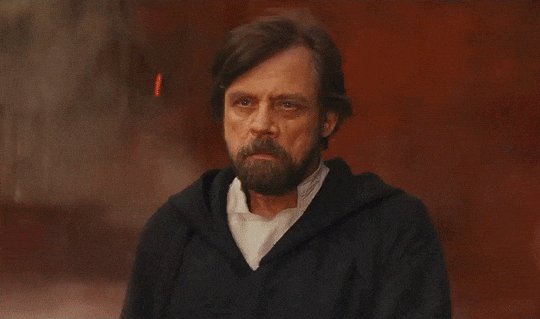
#star wars the last jedi#the last jedi#last jedi#star wars#rey#luke skywalker#kylo ren#ben solo#leia organa#general leia#general hux#resistance#episode ix#episode viii#episode 8#rian johnson#poe dameron#rose tico#star wars speculations#star wars theories#chewbacca#lando calrissian#captain phasma#original trilogy#empire strikes back#snoke#first order#a new hope#jedi#sith
30 notes
·
View notes
Text
Star Wars Episode VIII: The Last Jedi - A Masterpiece that Reminds us why Star Wars is Important
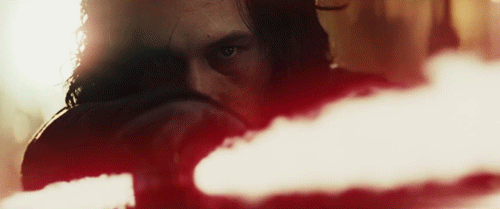
A warning up top: I cannot fully talk about this movie without giving out SPOILERS. I’ll try to keep them somewhat lite, but when it’s necessary events of the film will be described.
Everyone’s story of how they came to love Star Wars is very similar: they most likely saw it young and were absolutely enchanted by the imagination, creativity, and pure fun on display. There is no better escapism than Star Wars, as it allows us to forget the doldrums of our reality while also being a perfect example of Campbellian story-structure and a fascinating distillation of both Western and Eastern popular culture and philosophy. Since its release in 1977, it has grown into something much larger than it was intended to be. One can make a very compelling argument about its artistic merit being nearly completely absent since Return of the Jedi, but many filmmakers in the past have managed to slip thematic points and messages into even the most commercial of movies. It seems as though Star Wars, the epitome of commercialism and marketability, would be the last place nowadays one would look for thematic depth, but in maybe the most stunning upsets of the year for movies, Star Wars Episode VIII: The Last Jedi is an intensely emotional and thematically deep entry in the franchise that enriches its mediocre predecessor and pays a beautiful tribute to anyone that has been entranced by the magic of movies.
The general consensus around the that last entry, The Force Awakens, is that while it might have been a fun return to the universe, it was bogged down by being so subservient to the previous films in the franchise. Fan service can be a nice reward to those who have stuck with a property for a long time, but pointless references and retreads of previous plot-points can render the movie effectively inert when it comes to the spirit of the movie. But then comes along Rian Johnson, a director with a clear understanding of genre trappings, as shown in his high school Neo-Noir Brick or his paradox-ignoring time travel thriller Looper. Johnson smartly applies the same type of subversion techniques to Star Wars, meaning instead of simply parroting events or cliches from the previous movies, he alludes to them for a very specific reason and point. Gone are the moments where Ponda Baba and Dr. Evazan walk into the frame for a moment for no discernible reason, or the moment where Finn bumps the game board featured in A New Hope. Many fans, including myself, were concerned when the trailers featured AT-AT-like walkers, fearing a retread of the most-loved Star Wars entry. Instead, we got a film that challenges what we know about not only the characters we met in the last film, but challenges the entire concept of the original Star Wars trilogy by having us re-examine Luke Skywalker himself. And I am happy to say that Luke overcomes this challenge to reestablish himself as a true hero.
Earlier this year, while marketing Guardians of the Galaxy Vol. 2, the second movie in a planned trilogy, Marvel Studios claimed the movie’s tone would be “Empire-esque”. This is a term that has cropped up in film discussions, especially discussions of franchise films series, that has been used to describe a film with a darker tone than its predecessors that isn’t afraid to move in unexpected directions. However, The Last Jedi is much better described by that term than the second Guardians film is. What makes The Empire Strikes Back work so well as a sequel, and why it is often considered a better movie than the original Star Wars, is the fact that it broadened the universe, concepts, and characters of its predecessor in a way that was true to the essence of the original. The Last Jedi does this not only for The Force Awakens, but for the original trilogy as well. And it does it in the same way Empire did: by revealing that Luke Skywalker is a flawed human being that still has things to learn about the force, the nature of conflict, and of course himself.
As mentioned above, I will be discussing spoilers, and this is were I have to start getting into them, as the central theme of the movie cannot really be discussed without mentioning an appearance by a certain character. At a pivotal moment for Luke, he is visited by one of his old mentors, the spirit of the Master Jedi Yoda, who tells him that the best teacher of all is failure. And we see this sentiment ring true for every other character in the film. Rey fails to redeem Kylo Ren and places him in a higher position of power, where he will only be more dangerous. Poe makes a fool-hardy decision that almost entirely destroys the Resistance. Finn’s heart is not yet fully into the Resistance, and has anger building up over the injustices in the galaxy. Kylo Ren’s failure in the last movie has made him realize his reverence for Vader is only holding him back. Even minor characters like Admiral Holdo learn by making mistakes; if she had been open with Poe, he would not have planned subterfuge against her. But these mistakes and failures serve to round out our characters, give us a clearer picture of who they are, and allow them to overcome them in order to grow into more complete people. None of the failures are more destructive, and therefor more educational, than the mistake Luke made when he panicked about Ben Solo’s darker tendencies. But this failure allows him to eventually see what a Jedi teacher really should be, which is much different than what most fans think of when they think of a Master Jedi.
“War does not make one great” is one of the Yoda-isms we hear in The Empire Strikes Back, but until now no one has really given that line any credence. The reason Kylo Ren becomes so fascinated with Darth Vader is because of his status as one of the greatest warriors in their history. The good he did as a Jedi Knight, and as a reformed man at the end of Return of the Jedi, is of no interest to Kylo. Even the fans of Star Wars are more into Vader as a villain who slaughters people rather than a complex person who has strayed from the good path (just see the demand for and reaction to the Vader scene in Rogue One). And the prequel movies did nothing to help this issue of “warrior-worship” by giving all of the Jedi, including the peace-loving Yoda, fantastic battle abilities. But the way that Luke wins in Return of the Jedi is by throwing away his weapon - refusing to fight. Resolving conflicts with violence will only beget more violence. This is also the reason Obi-Wan refuses to engage with Vader in A New Hope, and why he is allowed to become one with the Force immediately afterwards. A Master Jedi must be a pacifist, inspiring others through peaceful means rather than inspiring others with violence. At the end of The Last Jedi, Luke demonstrates this to the entire galaxy with a legendary stand-off against Kylo Ren and an entire First Order invasion force. Shortly afterwards, he is allowed to become one with the Force, much like his beloved mentor Obi-Wan Kenobi. In the final scene, a child slave is hearing the legend of Luke Skywalker before being chased outside by one of his captors. He uses the Force to pull a broom towards him, looks to the sky, and sees a ship entering hyperspace. Inspired by his hero Luke, he dreams of adventure, a better world, a better life. That child is anyone who has been enchanted by the story of Luke. That child is Rian Johnson, J.J. Abrams, Gareth Edwards, and any other filmmaker that was raised on the original trilogy. That child is anyone, anywhere that has watched any of the Star Wars movies and fallen in love with the characters and the universe. It’s anyone who has watched a movie and been emotionally affected by it.
There are so many criticisms one can level at the film franchise Star Wars and the countless merchandising campaigns that it has spawned, but the true spirit of Star Wars has always been important. And this movie contains the true spirit of Star Wars. It has always been more philosophical than some people realize, but cloaked in a fun and creative sci-fi/fantasy setting. The Force Awakens didn’t deliver on the usual spirit of Star Wars, because it felt like a more corporate take on the original film. The Last Jedi feels like a true sequel to the franchise, pushing its characters in interesting directions, revealing more mysteries of the Force, and allowing us to see the characters in a new way. There are issues with the movie, things I can’t defend as being “good”, but the parts that work come together to form a beautiful film. A painting may have a few bad brush strokes here and there, but it doesn’t stop the entire picture from being great. Rian Johnson has directed a masterpiece that easily stands among the original Star Wars trilogy and will hopefully in time be just as loved as they are.
#the last jedi#star wars#episode viii#rian johnson#mark hamill#daisy ridley#oscar isaac#carrie fisher#adam driver#john boyega#luke skywalker#rey#kylo ren#finn#poe#leia#film#film essay
48 notes
·
View notes
Text
Review: The Last Jedi
At last! No excuses, it's just taken longer than I expected.
This is the first in my series reviewing The Last Jedi, giving a rough overview of the film and my impressions. I have a lot of them, but I'm going to try to keep this general and go into more detail on particular characters and arcs later.
Cut for spoilers for the new Star Wars trilogy (and the original trilogy, just to be safe) and some light spoilers for the Hobbit movies.
First thing to get it said: this was a gorgeous movie. The visuals were stunning; the shot of the fighters going across that salt flat and leaving red trails took my breath away and it was one of so many gorgeous moments. I could see everything in the fight scenes, there was just the right amount of slow-mo to make things dramatic without slowing things down, and basically one of my first comments once the credits were rolling and I'd got my breath back a bit was "That was pretty!". The new critters were great - the porgs weren't nearly as annoying as I was afraid they might be, though I do have to ask who the vegetarian on the writing team was because that scene was viscerally upsetting - and I liked the fact that they weren't purely tacked on to sell toys; there was little relevance to them, but they were there.
Can I just say again how nice it is to watch an action-heavy film with that much colour and such gorgeous visuals? Fie on all of you who say that mature movies can't be a joy to look at!
And damn, this movie was very grown-up. I really liked the themes of consequences and responsibility and trust and the idea that the protagonists can be wrong.
OK, there's a lot to talk about here and I'm having trouble working out where to start, hence the fact that this post - and now this series - is another one that I keep drafting and re-drafting. I think I'll start with the fact that, despite the fact that I've done my best not to expose myself to other people's reviews before writing my own, it hasn't escaped my notice that this film has not been as popular as the last one.
Now, I actually do get that. I really liked this film, but that doesn't mean it wasn't flawed and doesn't mean that the things I liked wouldn't be things that wouldn't upset people. For a start, that thing I mentioned up there about the movie being very grown-up. I don't want to sound patronising, but I do get that someone might quite reasonably protest that they don't come to Star Wars to be made uncomfortable about the nature of heroism, the fading of glory, and the difference between the good guys and the bad guys. It's just that I lap that kind of thing up. Plus, of course, I absolutely get how certain plot developments are, at first blush, a touch anti-climactic.
The thing is, though, that I say those plot developments come across as anti-climactic, but they actually do a lot for some of the themes starting to show up here. I'm going to go more into those shortly, but the first impression I had is that someone knows their Harry Potter with the whole idea of it not mattering where you came from but what choices you make: that was very much what I took away from the reveal of who Rey's parents were (and that it is Rey Random after all - I was rooting for Skywalker, but I'll take it), especially combined with some of the stuff Luke said about Ren and his "mighty Skywalker blood".
Another thing that this movie talked a lot about was new beginnings, and I think some of the stuff they did with that is another thing that some of the really die-hard fans have taken badly. Now, I'm not a die-hard Star Wars fan. I only recently watched Episodes 5 and 6 and haven't seen 4 since I was a kid, I never really read into any of the background information, and in fact it was only when I saw Force Awakens that I realised there might actually be something to this sci-fi movie series that everyone kept talking about.
I know that seems like an obvious conclusion, but popularity is no indication of quality - look at Twilight - and that goes double when it's something that's a massive cultural touchstone that it's blasphemy not to like. On an unrelated topic, Don't try to tell me about the beauty and power of Moby Dick. I don't care if it's a classic of American literature, I would actually rather re-read Twilight than continue to try to get through that book.
Also, side-note, how come nobody ever told me about Leia strangling Jabba the Hutt with that chain?
Anyway, I do get why someone who had grown up with Star Wars might find The Last Jedi difficult to love in a way that I, with my experience of the franchise, don't. However, I make no apologies for the fact that in my opinion this movie was incredible. Another first-impression comment I made (while arguing with someone at work who hated it) was that it was the first time for a while that I sat down to watch a movie and what I was seeing felt fresh. These felt like ideas and characters and arcs I hadn't seen a thousand times before. And that's especially good coming from Star Wars, which kind of has the reputation of being the most classic of the classics in terms of character and story structure.
Now, I deliberately didn't use the word "cliche". I personally think that's a very unfair term to use of things like Star Wars and Lord of the Rings, for the same reason as the joke "Oh, I don't like Shakespeare; it's just full of quotes" works: it's the thing everyone's quoting. Works like Star Wars are the same: while they were building on other things, they're such a massive cultural force that they changed their genres and a lot of people now copy things they made popular.
In terms of the rough story structure (girl finds plot-relevant doodad, gets whisked away on adventure with new sidekicks and elderly mentor, mentor dies, girl defeats baddie), The Force Awakens is pretty textbook (and a lot of people complained that it was just ripping off A New Hope, which makes it kind of hilarious when the same people complain that The Last Jedi isn't Star-Wars-like enough). The Last Jedi doesn't have the same classic structure. In some ways that's a good thing - I've not seen a mentor-student relationship like Rey's with Luke, and I certainly haven't seen an enemy relationship like Rey's with Ren - but I'll admit that it isn't always. And... let's talk about Space Monte Carlo.
This was a pretty big plot diversion, and while it had value it's arguably the biggest flaw in the film in my opinion: we spend a very long time off on this side quest with Finn and Rose and it actually turns out to have been a diversion. And I have to apply the same standard to this as I did to Desolation of Smaug: I don't like it when films willingly waste my time.
Now, I have more to say on that, including why that's actually not an accurate comparison (spoilers: at least Space Monte Carlo contributes to character development and theme, which is more than can be said for the Laketown Cul-de-sac because the Hobbit movies couldn't character-develop their way out of a wet paper bag and wouldn't know a theme if it jumped up and bit them).
Another thing The Last Jedi did, and this relates to Space Monte Carlo, was shatter the idea that the protagonists - especially the badass rebellious male protagonists - can't be wrong. It seems cruel, but one of my favourite things in this movie was the repeated cutting-down of Poe Dameron. That and presenting Luke as fallible were two of the gutsiest things this movie did, and thank you for them. Those were awesome, a fantastic subversion of tropes, and one of the major things that actually made this movie feel fresh.
Don't get me wrong - I enjoy Poe, but I liked him so much more once we'd seen that he can massively miscalculate, face consequences, and grow as a person.
What else, what else...
youtube
You're quite right, my Vulcan friend.
We got new female characters! One of them got to make an awesome heroic-sacrifice last stand! One of them made a heartfelt speech expressing empathy for the downtrodden and forgotten, prompting the male lead to look past superficial beauty to the seamy underbelly, then said one of my favourite lines in the movie summing up a philosophy of resistance I'd not encountered in any other movie!
I liked Rose. That may become obvious.
Also, Rey continued to develop and be awesome, Leia was great (she was mad broken in terms of stats, but that seems to be par for the course with Jedi and similar), and there were just loads and loads of other minor female characters doing their thing without anyone needing to remark on their gender, which felt great.
Now, take the rough with the smooth, we will talk about Phasma. That was a pretty serious let-down and also pretty poor craft. Like, really, Movie? Come on, just admit you had no idea what to do with that character from the moment you came up with the concept.
Overall, I'll admit that this movie was flawed. Phasma really was a waste of a cool concept, the Space Monte Carlo sequence was a pretty major detour that made it feel a bit like the characters had spent half the film chasing their tails, and a lot of plot threads that had been built up huge were rather abruptly cauterised.
I still absolutely loved it. It was trying new things, it was taking big risks, and I respect that and really enjoyed the results.
That was a touch whistle-stop, but I wanted to go deep on some specific things. Next up, the villains and the concepts of good and evil in "Darkness Rises, and Light to Meet It".
They’re not all titled after quotes, I promise.
7 notes
·
View notes
Text
Star Wars: The Mandalorian – Baby Yoda Explained
https://ift.tt/eA8V8J
This Star Wars: The Mandalorian article contains spoilers.
The Mandalorian is back for a second season featuring more adventures for Mando and the Child, better known as our beloved Baby Yoda. Ever since the Force-sensitive Child was introduced in the first episode as a helpless bounty sought after by Imperial agents, this little character has stolen the show, giving us a new twist on the well-established concept of Jedi Master Yoda. Not that the character is related to his famous movie predecessor. In fact, we don’t yet know where Baby Yoda comes from or who his people are, which is why The Mandalorian season 2 will see the duo embark on a journey to find Baby Yoda’s home.
At the end of the first season, the Armorer tells Mando that it’s possible Baby Yoda’s people are the Jedi, ancient sorcerers and enemies of the Mandalorians, but it’s also suggested at one point that he might be the result of some pretty nefarious experiments. Based on what we know, it could really go either way. We certainly wouldn’t put it past the Empire to try and clone their own version of the Jedi Master to control.
As The Mandalorian season 2 kicks off, let’s break down the mystery and what the movies, Expanded Universe of books and comics, and lore tell us about Baby Yoda.
Stream Star Wars shows with a FREE TRIAL of Disney+!
What is Yoda’s species?
We don’t exactly know. Not only is their home planet unknown, but so is the species’ real name (if it even has one), which is why it’s simply refered to as “Yoda’s species.”
When George Lucas originally created the character, Yoda was intended as a mysterious creature, an open-ended question in a wide universe. “He’s a mystery character,” Lucas said in an interview with Moviefone. “He’s a magical character. He has no background. He comes and he goes. He’s the subversive secret mysterious stranger that enters the film and then exits at the end.”
Puppeteering and voice acting by Frank Oz catapulted the character into fame. In some original concept art, Yoda is more elf-like than alien, with longer legs and a pointed hat that wouldn’t be out of place on a classic gnome. The pointed ears are the surviving trait that display the character’s fantasy influence.
There is one other member of this species in Star Wars canon: Yaddle, a Jedi Master who sat on the Jedi Council in the Prequel era. She was known for both exuding patience and kindness, and having exceptionally deadly Force powers that could trap a person in stasis.
The species is so rare and mysterious that no one knows what exactly is so mysterious about them. Is it happenstance that their species produced the greatest Jedi Master in the modern era? Perhaps there is something inherently powerful in the Force about them. Perhaps they’re no more or less likely to be great Jedi than humans are.
Episode 2, “The Child,” might have offered an answer. Early in the episode, the baby reaches out a hand as if trying to use the Force to heal the wounded Mando, who puts him back in the bassinet before anything can happen (we later learn in episode 7 that Baby Yoda can indeed heal severe wounds.) The fact that Baby Yoda is Force-sensitive is confirmed later in episode 2 when the Child lifts the charging Mud Horn monster with the Force. It clearly takes a lot out of the Child, a Herculean effort of a task that would be challenging even for an adult Jedi. Remember how Luke struggled to lift his X-Wing out of the swamp? This baby can use the Force before he can even talk. Clearly he’s powerful, and it makes sense based on what we know about this species that the power could be inherent in his biology.
At the very least, we’re all expecting him to the magic hand thing now, just like Greef.
What does Baby Yoda mean for Star Wars canon?
Part of the reason the big reveal in the series premiere is so remarkable is that Lucas has long advocated for keeping Yoda’s species secret. When everything in Star Wars is explained, the universe feels big, but it can also feel rote. The Yoda species remains an element that cannot be canonized, cannot be commodified. It gestures at Star Wars’ fantasy influences while not going so far as to outright explain the motivation behind the gesture.
Baby Yoda’s Force powers also draw a direct line to the Jedi, an order that seems to have been long forgotten by the time of the New Republic. Despite Luke Skywalker’s legendary exploits for the Rebellion, news doesn’t really seem to travel as far as the Outer Rim of the galaxy. So far, The Mandalorian exists in the underworld of Star Wars. Characters scrape by on the strength of their wallets and their fists. Jedi don’t often venture into this world unless it’s to stop a crime lord who has severely rattled someone in the upper echelons.
Will this Force-sensitive Child give The Mandalorian a way to connect its otherwise Force-secular story to the mystical side of the galaxy in season 2? If Mando is to complete his mission (and fan-favorite Jedi hero Ahsoka Tano really is set to appear on the show), then he’ll eventually have to rub elbows with the sorcerers his people are taught to be wary about.
The age of the Child, 50, is also notable. The Mandalorian takes place five years after Return of the Jedi. That means the alien was born before even the start of the Clone Wars, when the Republic was just beginning its slide toward galaxy-wide conflict. This is one of the reasons some fans believe the Child could be related to Yoda, who was still very active on a galactic stage in the Prequels, but the Jedi of old aren’t supposed to have children. So is the Child possibly a war refugee like Mando himself? A desperate attempt at continuity for a species that only has one or two members at a time? Or just one of many children gone missing in a dangerous galaxy?
Whatever the case, the implications of Baby Yoda’s existence remains one of the central mysteries on the show.
So where did Baby Yoda come from?
Maybe “Baby Yoda” is just what his name implies. As Slashfilm points out via sharp-eyed Twitter users, Doctor Pershing (Omid Abtahi) might offer a clue. The man employed by Werner Herzog’s character in season 1 has a symbol on his sleeve that might match the one worn by Kaminoan cloners, which implies that this doctor has some pretty specific plans for Yoda’s species. We later see him running tests on Baby Yoda, although those experiments are cut short when Mando rescues the Child.
Later in the season, the Ugnaught farmer Kuill suggests Baby Yoda could be a “strand-cast,” a bio-engineered organism that we learned way more about in The Rise of Skywalker (both Supreme Leader Snoke and Rey’s father were revealed to have been strand-casts created by the Emperor’s imperfect clone and the Sith Eternal). It’s very possible that Baby Yoda was created in a lab as a way to learn more about how to capture the powers of Force user inside a clone body. We know the Sith tried to do just this with the Emperor’s son, but failed to transfer the Sith lord’s powers to the strand-cast (although Rey would eventually inherit these exact powers, including Force lightning, one generation later). Baby Yoda might have been the first and only bio-engineered specimen to have inherited the powers of his predecessor, which is why Imperial scientists would want to study him further while trying to properly resurrect their Emperor.
There’s precedence for all of this, of course. Cloning has been a part of Star Wars since the very beginning, with the Clone Wars being mentioned as early as A New Hope, but wasn’t detailed until Attack of the Clones. And with The Rise of Skywalker bringing cloning and weird science back to the forefront of this universe, Baby Yoda’s strand-cast origin story is looking much more likely now.
Other origin possibilities are more banal:
When it comes to the unknown in Star Wars, there is one direction fans can reliably look. The Unknown Regions, called as such because hyperspace navigation is so difficult in this anomalous region of space, exist at the edge of the galaxy. Some people have found ways to explore it, namely Grand Admiral Thrawn’s Chiss species and some members of the Empire.
Maybe Yoda’s species is from this region? Since the Mandalorian’s adventures mostly keep him in the relatively lawless Outer Rim of the galaxy, he’s geographically placed in the right spot to venture into this dangerous sector of space in season 2 if the show really wants to venture into unexplored territory on screen.
What does Baby Yoda mean for the Mandalorian himself?
Regardless of who he is and where he comes from, Baby Yoda has provided a major pivot point for Mando, who decides to break the Bounty Hunters’ Guild’s code to save the child from the Client, taking the reward and the bounty itself with him to parts unknown. This not only makes Mando one of the most wanted men in the galaxy but also a confirmed anti-hero who chooses to do right when faced with a life-changing decision.
Throughout the first season, Mando is most concerned with what’s right for the Child and finding a place where he might be safe from the other bounty hunters still looking to cash in and the Empire. Mando hasn’t found that hideout yet, having been foiled at every turn, but he has found a heart where the show initially suggested there might not be one. We expect the Mandalorian’s fatherly role to only grow as long as he’s protecting his young ward.
cnx.cmd.push(function() { cnx({ playerId: "106e33c0-3911-473c-b599-b1426db57530", }).render("0270c398a82f44f49c23c16122516796"); });
The post Star Wars: The Mandalorian – Baby Yoda Explained appeared first on Den of Geek.
from Den of Geek https://ift.tt/2TyvmQC
0 notes
Text
Star Wars: The Last Jedi
I don’t enjoy going on about things I dislike – it’s more fun talking about things you enjoy.
But I keep seeing articles implying that the only people that dislike The Last Jedi are diversity-phobic members of the Alt Right and some dusty old nitpicky nerds that hate anything new. So as a someone that doesn’t fit into either of those boxes: I disliked the movie. A lot.
Let’s look at Rey first. Now, The Last Jedi isn’t The Empire Strikes Back, and shouldn’t be judged as a remake of that movie, but for the sake of comparing a trilogy to a similar trilogy it’s worth taking a moment to compare where Luke was at this part of the original Star Wars: when he abandoned his training with Yoda, we were shown that nothing was more important to Luke than Leia and the others. In contrast, Rey cares about “The Resistance,” but barely spares a thought for individual members. She doesn’t even meet Poe until near the end. I’m not saying that they needed to slavishly copy the original, but damn, the emotional connection between the members of the “new trinity” is frankly bordering on nonexistent. Rey doesn’t rush off to rescue any actual friends; she ditches Luke to save Kylo, i.e. the guy that literally tortured her.
At the end of Empire, we saw that Luke would be going against apparently impossible odds in the third movie, because when he fought Vader he lost so resoundingly it cost him a hand. Comparing that setup to Rey and Kylo Ren… Ren is a joke. Rey defeated him at the end of The Force Awakens, and trounced him so badly in The Last Jedi that the scene of her knocking him unconscious wasn’t even considered important enough to show. We’re shown Rey debating whether or not to fight him, then Hux walking in to find Kylo unconscious. The only reason he’s still alive is Rey inexplicably took pity on a guy that thinks it’s awesome to destroy entire populated solar systems.
Which brings us to the next comparison. The big revelation at the end of Empire Strikes Back raised the emotional stakes even further – Luke not only had to defeat “Darth Vader,” he had to wrestle with a lifetime of emotional baggage since Vader turned out to be his own long-lost father. Their conflict was given an emotional charge. Meanwhile Rey and Kylo are given some sort of connection, but… why? Why does she give a damn about the guy that tortured her, slaughtered countless innocents, and murdered a man she was starting to see as a father figure? There’s no justifiable explanation for it. Rey feels an emotional connection and deep-seated need to redeem a genocidal maniac, for no good reason.
The big revelation about Rey’s past turned out to be that there’s no big revelation in Rey’s past. Now, I can see where people are coming from when they say that it’s an interesting subversion, but in conjunction with everything else that’s going on it just cements how isolated Rey is from the rest of the cast. There is nothing of significance linking her to any character beyond her interactions with Finn in the first movie – interactions so neglected in the second movie that I would characterize their friendship as being abandoned to rot by the director. The two characters barely said anything to one another. Throw in that that we’ve established Kylo doesn’t represent a physical threat to her and the stakes could hardly be lower for her going in to the third movie. Maybe the revelation could’ve worked in the final movie, but here it just pours sand in the narrative’s gastank.
But Rey still fared better than poor Finn. Poor poor Finn, who would’ve been of way more use to the Rebels if he’d just stayed in a coma. I hate typing that, but it’s true. The entire subplot with Finn and Rose was a bad joke: they failed their mission to sabotage the First Order’s tracker, their mission turned out to be unnecessary to the Resistance because Vice Admiral Holdo had her own plan to avoid the tracker, but in a twist Finn and Rose managed to fail so spectacularly that not only were they unable to implement their own plan but they also tipped off the First Order about Holdo’s plan. Finn’s contribution to the plot was getting the Resistance nearly wiped out. Poe shoulders some blame there too of course, meaning that two of the three main heroes would’ve been more helpful to their side if they’d just died in the opening scenes.
Of course there’s so much failure in this movie that there’s plenty to go around – special mention has to go to Vice Admiral Holdo, who set the problem in motion by deciding not to share the information about her plan, instead thinking it was a good idea to let her soldiers think that her plan was to have them meekly try to fly away from the bad guys and get slaughtered without even putting up a fight. Star Wars has had a lot of incompetent military leaders, but that blunder has to take the cake. Holdo of course redeemed herself a bit by ramming her ship into the Star Destroyer at lightspeed, a moment that should leave folks scratching their heads and wondering “if you can take out the biggest ship in the First Order’s fleet by having a ship with only one person on it go to lightspeed, why isn’t that something the Resistance is doing all the time? And why was that a last-minute addendum to her plan, and not a key component all along?”
I’m sure people characterize this as finicking fun-hating nerd nitpicking, but honestly, they’re shown us that one person can pilot a ship in a way that instantly turns it into a Death Star-level superweapon. The major threat in the movie is the Star Destroyer that was very slowly giving chase, and Rian Johnson resolved that threat by saying that actually the good guys had literally been sitting on a solution the whole time and just never used it. It’s not a minor detail, it’s the resolution to the threat that loomed over the course of the whole movie. And why did the slightly-smaller Rebel battleships that got blown up earlier never ramming? Why has nobody in any Star Wars movie ever tried to ram another ship at lightspeed if it’s effectively a one-shot-kill? Resolving the major threat in the movie by saying that there’s been a war-ending weapon at everyone’s fingertips the whole time, over the course of several movies, that nobody ever used, with no reason for not using it, is bad writing. To put it mildly.
I’ve heard people saying that the Poe-and-Holdo tension was meant to tell us something, but what? Young people should meekly listen to their elders, even when their elders are giving terrible orders and not bothering to pass on the real plan? Presumably there was an intent to say something about there being no room for “space cowboys” any more, but whatever the intention was it’s undermined by the atrociously bad writing. Generals may not be required to spell out every detail, but there was absolutely no good reason for Holdo to stand there quietly when Poe accused her of planning to just fly away without putting up a fight, hope real hard that the First Empire doesn’t massacre them. Rian Johnson had her react like that to create a surprise when we learned that she had a plan, but in-story it just makes Poe completely in the right. If your commanding officer tells you to quietly march with your back to the enemy and hope you don’t get shot, you don’t go “yes sir!” A leader has a responsibility to instill at least some confidence.
And it’s worth repeating that Finn, Poe, and Rey barely interact. Finn and Poe get a little more time together than Rey gets with, well, anyone other than Luke and Kylo, but still not a whole lot. Going in to the third movie we’ve got three main protagonists that met for a brief time in the first movie (never all together though), and didn’t build on those interactions in the second movie.
Lastly, I’ll say that as a Star Wars fan that’s been following the series for decades, I was sad to see Admiral Ackbar killed off like a nobody, and Luke turned into a bitter old man that mutters “humbug!” at the thought of rebellion. I’ve seen a few people claiming that it was important because in 2017 the narrative needs to be that old people screwed everything up and the younger generation has to clean up the mess. I’ve even seen it called realistic. How bitter and cynical does one have to be to confuse realism with pessimism? But the excuse for why the older characters are shown as failures in this movie doesn’t even hold up – a quick glance at what Finn and Poe accomplished is sufficient to see that the young people in this movie were no better at getting things right.
As escapism, this movie was dire. As a continuing narrative using characters established in previous movies, this movie was disastrous. In terms of telling a story that even makes sense within the established setting, this film completely failed.
The thing is, when I walked out of Episode I and Episode II, I knew I had watched something bad, but I was able to focus on the few good scenes and tell myself “maybe the next movie will be better.” I can’t do that here, because Rian Johnson so utterly kneecapped things, leaving so little to resolve and so utterly failing to establish relationships in his main characters. In that sense then, I would call this the worst of the Star Wars movies.
#Star Wars#Star Wars: The Last Jedi#swtlj#swtlj spoilers#the last jedi#the last jedi spoilers#star wars spoilers#I hated this movie#Now that I've said how much I hate it I can move on with my life
5 notes
·
View notes